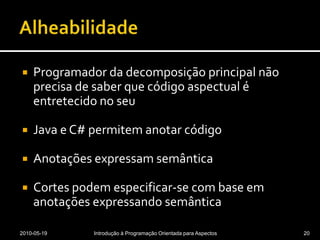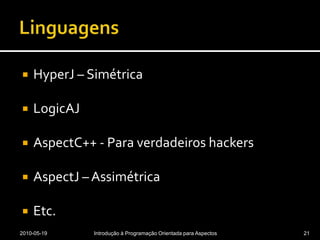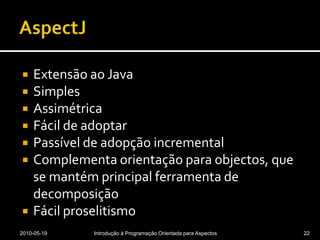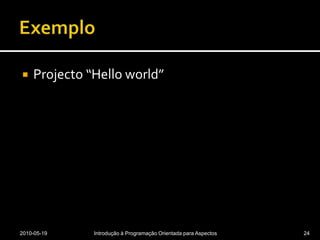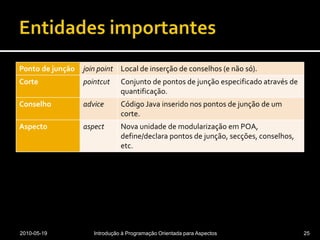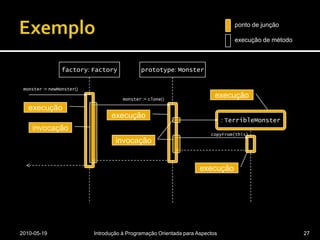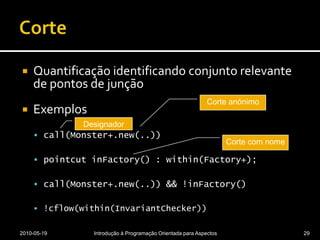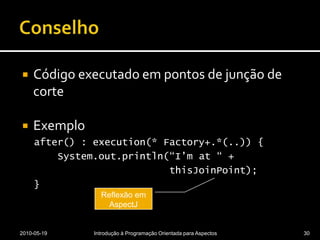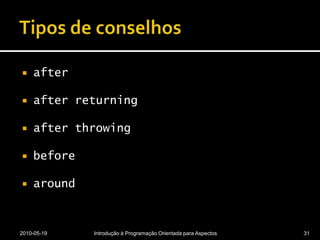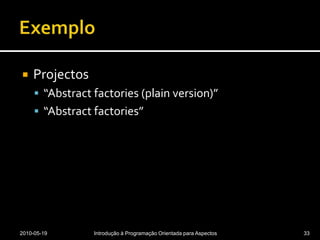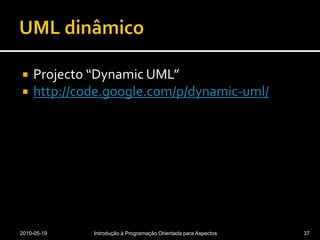The document provides an introduction to aspect-oriented programming (AOP) by Manuel Menezes de Sequeira, covering its motivation, fundamental concepts, and applications. It discusses concerns related to functional and non-functional requirements, as well as implementation policies, while emphasizing the modularization of cross-cutting concerns. The text also presents examples and challenges associated with AOP, particularly in relation to the Apache Tomcat servlet container.
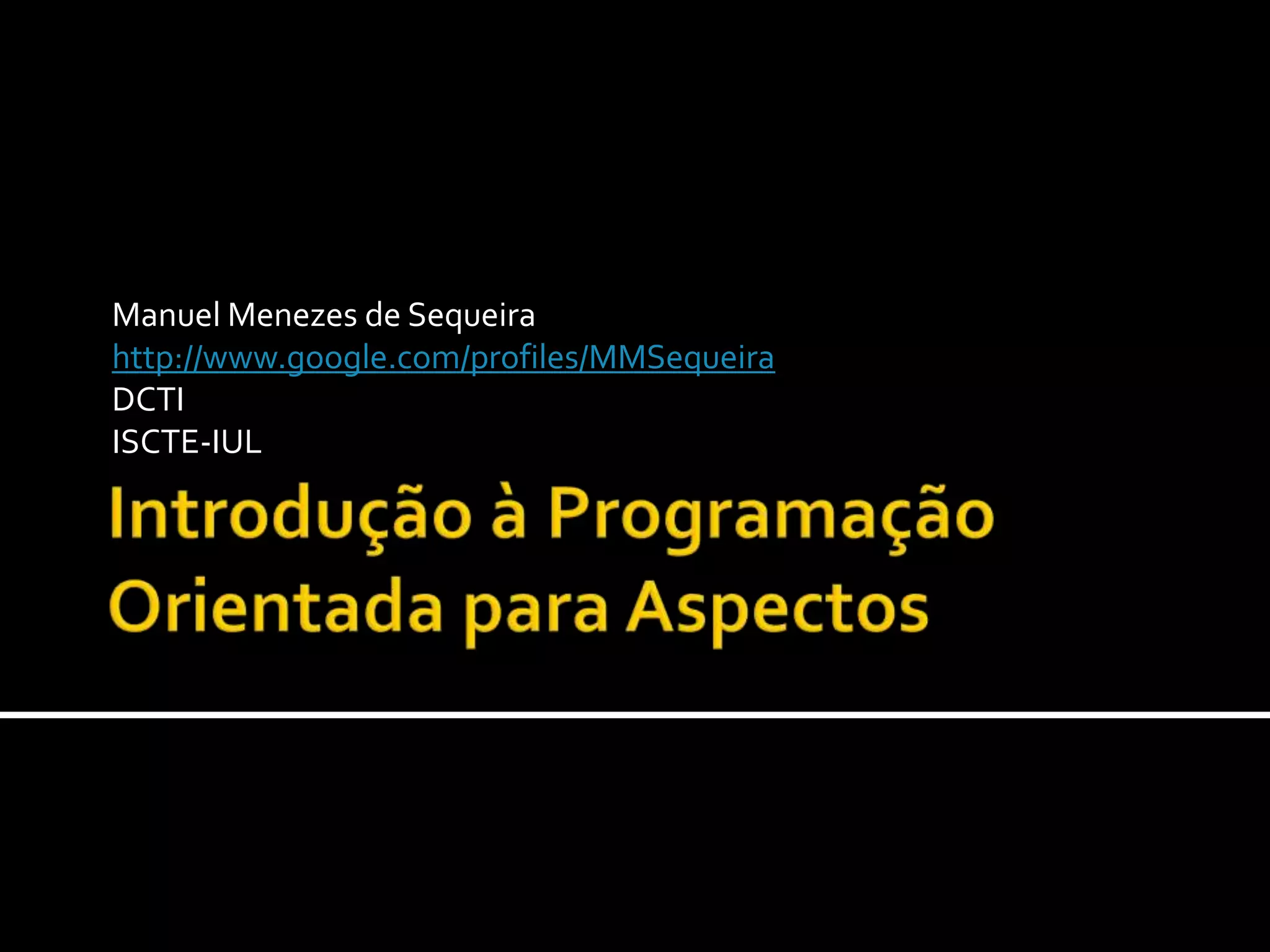
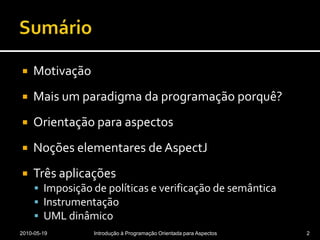


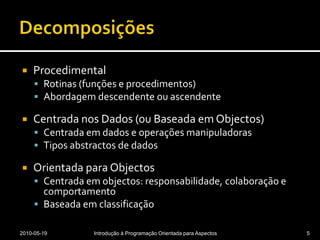

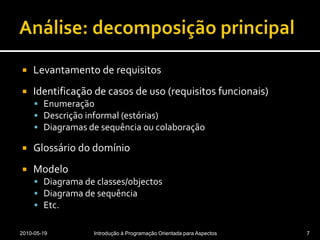


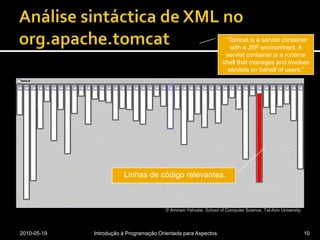
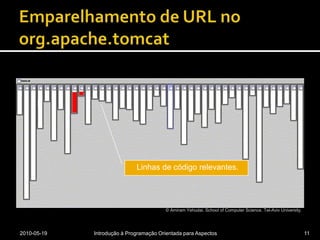
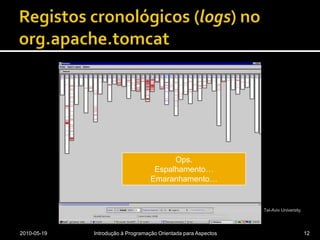

![O que se pretende2010-05-19Introdução à Programação Orientada para Aspectos14ApplicationSessionStandardSessionSessionInterceptorApplicationSessionStandardSessionSessionInterceptor private long lastAccessed = creationTime; private int inactiveInterval = -1; void accessed() { // set last accessed to thisAccessTime as it will be left over // from the previous access lastAccessed = thisAccessTime; thisAccessTime = System.currentTimeMillis(); validate(); } void validate() { // if we have an inactive interval, check to see if we've exceeded it if (inactiveInterval != -1) { int thisInterval = (int)(System.currentTimeMillis() - lastAccessed) / 1000; if (thisInterval > inactiveInterval) { invalidate(); } } } public long getLastAccessedTime() { if (valid) { return lastAccessed; } else { String msg = sm.getString("applicationSession.session.ise"); throw new IllegalStateException(msg); } } public long getLastAccessedTime() { return lastAccessed; } private long lastAccessed = creationTime; void accessed() { // set last accessed to thisAccessTime as it will be left over // from the previous access lastAccessed = thisAccessTime; thisAccessTime = System.currentTimeMillis(); }void validate() { // if we have an inactive interval, check to see if // we've exceeded itif (inactiveInterval != -1) { int thisInterval = (int)(System.currentTimeMillis() - lastAccessed) / 1000; if (thisInterval > inactiveInterval) { invalidate(); ServerSessionManager ssm = ServerSessionManager.getManager(); ssm.removeSession(this); } } } private long lastAccessedTime = creationTime;/** * Return the last time the client sent a request associated with this * session, as the number of milliseconds since midnight, January 1, 1970 * GMT. Actions that your application takes, such as getting or setting * a value associated with the session, do not affect the access time. */ public long getLastAccessedTime() { return (this.lastAccessedTime); } this.lastAccessedTime = time;/** * Update the accessed time information for this session. This method * should be called by the context when a request comes in for a particular * session, even if the application does not reference it. */ public void access() { this.lastAccessedTime = this.thisAccessedTime; this.thisAccessedTime = System.currentTimeMillis(); this.isNew=false; } lastAccessedTime = 0L; lastAccessedTime = ((Long) stream.readObject()).longValue(); maxInactiveInterval = ((Integer) stream.readObject()).intValue(); isNew = ((Boolean) stream.readObject()).booleanValue();stream.writeObject(new Long(lastAccessedTime)); sM.accessed(ctx, request, sessionId );public void accessed( Context ctx, Request req, String id ) { ApplicationSession apS=(ApplicationSession)findSession( ctx, id); if( apS==null) return; ServerSession servS=apS.getServerSession(); servS.accessed(); apS.accessed(); // cache it - no need to compute it again req.setSession( apS ); }/** * Invalidate all sessions that have expired. */ private void processExpires() { long timeNow = System.currentTimeMillis(); Session sessions[] = findSessions(); for (int i = 0; i < sessions.length; i++) { StandardSession session = (StandardSession) sessions[i]; if (!session.isValid()) continue; int maxInactiveInterval = session.getMaxInactiveInterval(); if (maxInactiveInterval < 0) continue; int timeIdle = // Truncate, do not round up (int) ((timeNow - session.getLastAccessedTime()) / 1000L); if (timeIdle >= maxInactiveInterval) session.expire(); } }/** * Mark the specified session's last accessed time. This should be * called for each request by a RequestInterceptor. * * @param session The session to be marked */ public void accessed(Context ctx, Request req, String id) { HttpSession session=findSession(ctx, id); if( session == null) return; if (session instanceof Session) ((Session) session).access(); // cache the HttpSession - avoid another find req.setSession( session ); }StandardManagerpackage org.apache.tomcat.request;import org.apache.tomcat.core.*;import org.apache.tomcat.util.*;import java.io.*;import java.net.*;import java.util.*;import javax.servlet.http.*;/** * Will process the request and determine the session Id, and set it * in the Request. * It also marks the session as accessed. * * This implementation only handles Cookies sessions, please extend or * add new interceptors for other methods. * */public class SessionInterceptor extends BaseInterceptor implements RequestInterceptor { // GS, separates the session id from the jvm route static final char SESSIONID_ROUTE_SEP = '.'; int debug=0; ContextManager cm; public SessionInterceptor() { } public void setDebug( int i ) { System.out.println("Set debug to " + i); debug=i; } public void setContextManager( ContextManager cm ) { this.cm=cm; } public int requestMap(Request request ) { String sessionId = null; Cookie cookies[]=request.getCookies(); // assert !=null for( int i=0; i<cookies.length; i++ ) { Cookie cookie = cookies[i]; if (cookie.getName().equals("JSESSIONID")) { sessionId = cookie.getValue(); sessionId=validateSessionId(request, sessionId); if (sessionId!=null){ request.setRequestedSessionIdFromCookie(true); } } } String sig=";jsessionid="; int foundAt=-1; if( debug>0 ) cm.log(" XXX RURI=" + request.getRequestURI()); if ((foundAt=request.getRequestURI().indexOf(sig))!=-1){ sessionId=request.getRequestURI().substring(foundAt+sig.length()); // rewrite URL, do I need to do anything more? request.setRequestURI(request.getRequestURI().substring(0, foundAt)); sessionId=validateSessionId(request, sessionId); if (sessionId!=null){ request.setRequestedSessionIdFromURL(true); } } return 0; } // XXX what is the correct behavior if the session is invalid ? // We may still set it and just return session invalid. /** Validate and fix the session id. If the session is not valid return null. * It will also clean up the session from load-balancing strings. * @return sessionId, or null if not valid */ private String validateSessionId(Request request, String sessionId){ // GS, We piggyback the JVM id on top of the session cookie // Separate them ... if( debug>0 ) cm.log(" Orig sessionId " + sessionId ); if (null != sessionId) { int idex = sessionId.lastIndexOf(SESSIONID_ROUTE_SEP); if(idex > 0) { sessionId = sessionId.substring(0, idex); } } if (sessionId != null && sessionId.length()!=0) { // GS, We are in a problem here, we may actually get // multiple Session cookies (one for the root // context and one for the real context... or old session // cookie. We must check for validity in the current context. Context ctx=request.getContext(); SessionManager sM = ctx.getSessionManager(); if(null != sM.findSession(ctx, sessionId)) { sM.accessed(ctx, request, sessionId ); request.setRequestedSessionId(sessionId); if( debug>0 ) cm.log(" Final session id " + sessionId ); return sessionId; } } return null; } public int beforeBody( Request rrequest, Response response ) { String reqSessionId = response.getSessionId(); if( debug>0 ) cm.log("Before Body " + reqSessionId ); if( reqSessionId==null) return 0; // GS, set the path attribute to the cookie. This way // multiple session cookies can be used, one for each // context. String sessionPath = rrequest.getContext().getPath(); if(sessionPath.length() == 0) { sessionPath = "/"; } // GS, piggyback the jvm route on the session id. if(!sessionPath.equals("/")) { String jvmRoute = rrequest.getJvmRoute(); if(null != jvmRoute) { reqSessionId = reqSessionId + SESSIONID_ROUTE_SEP + jvmRoute; } } Cookie cookie = new Cookie("JSESSIONID", reqSessionId); cookie.setMaxAge(-1); cookie.setPath(sessionPath); cookie.setVersion(1); response.addHeader( CookieTools.getCookieHeaderName(cookie), CookieTools.getCookieHeaderValue(cookie)); cookie.setVersion(0); response.addHeader( CookieTools.getCookieHeaderName(cookie), CookieTools.getCookieHeaderValue(cookie)); return 0; } /** Notification of context shutdown */ public void contextShutdown( Context ctx ) throws TomcatException { if( ctx.getDebug() > 0 ) ctx.log("Removing sessions from " + ctx ); ctx.getSessionManager().removeSessions(ctx); }}StandardManagerpackage org.apache.tomcat.request;import org.apache.tomcat.core.*;import org.apache.tomcat.util.*;import java.io.*;import java.net.*;import java.util.*;import javax.servlet.http.*;/** * Will process the request and determine the session Id, and set it * in the Request. * It also marks the session as accessed. * * This implementation only handles Cookies sessions, please extend or * add new interceptors for other methods. * */public class SessionInterceptor extends BaseInterceptor implements RequestInterceptor { // GS, separates the session id from the jvm route static final char SESSIONID_ROUTE_SEP = '.'; int debug=0; ContextManager cm; public SessionInterceptor() { } public void setDebug( int i ) { System.out.println("Set debug to " + i); debug=i; } public void setContextManager( ContextManager cm ) { this.cm=cm; } public int requestMap(Request request ) { String sessionId = null; Cookie cookies[]=request.getCookies(); // assert !=null for( int i=0; i<cookies.length; i++ ) { Cookie cookie = cookies[i]; if (cookie.getName().equals("JSESSIONID")) { sessionId = cookie.getValue(); sessionId=validateSessionId(request, sessionId); if (sessionId!=null){ request.setRequestedSessionIdFromCookie(true); } } } String sig=";jsessionid="; int foundAt=-1; if( debug>0 ) cm.log(" XXX RURI=" + request.getRequestURI()); if ((foundAt=request.getRequestURI().indexOf(sig))!=-1){ sessionId=request.getRequestURI().substring(foundAt+sig.length()); // rewrite URL, do I need to do anything more? request.setRequestURI(request.getRequestURI().substring(0, foundAt)); sessionId=validateSessionId(request, sessionId); if (sessionId!=null){ request.setRequestedSessionIdFromURL(true); } } return 0; } // XXX what is the correct behavior if the session is invalid ? // We may still set it and just return session invalid. /** Validate and fix the session id. If the session is not valid return null. * It will also clean up the session from load-balancing strings. * @return sessionId, or null if not valid */ private String validateSessionId(Request request, String sessionId){ // GS, We piggyback the JVM id on top of the session cookie // Separate them ... if( debug>0 ) cm.log(" Orig sessionId " + sessionId ); if (null != sessionId) { int idex = sessionId.lastIndexOf(SESSIONID_ROUTE_SEP); if(idex > 0) { sessionId = sessionId.substring(0, idex); } } if (sessionId != null && sessionId.length()!=0) { // GS, We are in a problem here, we may actually get // multiple Session cookies (one for the root // context and one for the real context... or old session // cookie. We must check for validity in the current context. Context ctx=request.getContext(); SessionManager sM = ctx.getSessionManager(); if(null != sM.findSession(ctx, sessionId)) {request.setRequestedSessionId(sessionId); if( debug>0 ) cm.log(" Final session id " + sessionId ); return sessionId; } } return null; } public int beforeBody( Request rrequest, Response response ) { String reqSessionId = response.getSessionId(); if( debug>0 ) cm.log("Before Body " + reqSessionId ); if( reqSessionId==null) return 0; // GS, set the path attribute to the cookie. This way // multiple session cookies can be used, one for each // context. String sessionPath = rrequest.getContext().getPath(); if(sessionPath.length() == 0) { sessionPath = "/"; } // GS, piggyback the jvm route on the session id. if(!sessionPath.equals("/")) { String jvmRoute = rrequest.getJvmRoute(); if(null != jvmRoute) { reqSessionId = reqSessionId + SESSIONID_ROUTE_SEP + jvmRoute; } } Cookie cookie = new Cookie("JSESSIONID", reqSessionId); cookie.setMaxAge(-1); cookie.setPath(sessionPath); cookie.setVersion(1); response.addHeader( CookieTools.getCookieHeaderName(cookie), CookieTools.getCookieHeaderValue(cookie)); cookie.setVersion(0); response.addHeader( CookieTools.getCookieHeaderName(cookie), CookieTools.getCookieHeaderValue(cookie)); return 0; } /** Notification of context shutdown */ public void contextShutdown( Context ctx ) throws TomcatException { if( ctx.getDebug() > 0 ) ctx.log("Removing sessions from " + ctx ); ctx.getSessionManager().removeSessions(ctx); }}/* * ==================================================================== * * The Apache Software License, Version 1.1 * * Copyright (c) 1999 The Apache Software Foundation. All rights * reserved. * * Redistribution and use in source and binary forms, with or without * modification, are permitted provided that the following conditions * are met: * * 1. Redistributions of source code must retain the above copyright * notice, this list of conditions and the following disclaimer. * * 2. Redistributions in binary form must reproduce the above copyright * notice, this list of conditions and the following disclaimer in * the documentation and/or other materials provided with the * distribution. * * 3. The end-user documentation included with the redistribution, if * any, must include the following acknowlegement: * "This product includes software developed by the * Apache Software Foundation (http://www.apache.org/)." * Alternately, this acknowlegement may appear in the softwareitself, * if and wherever such third-party acknowlegements normally appear. * * 4. The names "The Jakarta Project", "Tomcat", and "Apache Software * Foundation" must not be used to endorse or promote productsderived * from this software without prior written permission. For written * permission, please contact apache@apache.org. * * 5. Products derived from this software may not be called "Apache" * nor may "Apache" appear in their names without prior written * permission of the Apache Group. * * THIS SOFTWARE IS PROVIDED ``AS IS'' AND ANY EXPRESSED OR IMPLIED * WARRANTIES, INCLUDING, BUT NOT LIMITED TO, THE IMPLIED WARRANTIES * OF MERCHANTABILITY AND FITNESS FOR A PARTICULAR PURPOSE ARE * DISCLAIMED. IN NO EVENT SHALL THE APACHE SOFTWARE FOUNDATION OR * ITS CONTRIBUTORS BE LIABLE FOR ANY DIRECT, INDIRECT, INCIDENTAL, * SPECIAL, EXEMPLARY, OR CONSEQUENTIAL DAMAGES (INCLUDING, BUT NOT * LIMITED TO, PROCUREMENT OF SUBSTITUTE GOODS OR SERVICES; LOSS OF * USE, DATA, OR PROFITS; OR BUSINESS INTERRUPTION) HOWEVER CAUSED AND * ON ANY THEORY OF LIABILITY, WHETHER IN CONTRACT, STRICT LIABILITY, * OR TORT (INCLUDING NEGLIGENCE OR OTHERWISE) ARISING IN ANY WAY OUT * OF THE USE OF THIS SOFTWARE, EVEN IF ADVISED OF THE POSSIBILITY OF * SUCH DAMAGE. * ==================================================================== * * This software consists of voluntary contributions made by many * individuals on behalf of the Apache Software Foundation. For more * information on the Apache Software Foundation, please see * <http://www.apache.org/>. * * [Additional notices, if required by prior licensing conditions] * */package org.apache.tomcat.session;import org.apache.tomcat.core.*;import org.apache.tomcat.util.StringManager;import java.io.*;import java.net.*;import java.util.*;import javax.servlet.*;import javax.servlet.http.*;/** * Core implementation of an application level session * * @author James Duncan Davidson [duncan@eng.sun.com] * @author Jason Hunter [jch@eng.sun.com] * @author James Todd [gonzo@eng.sun.com] */public class ApplicationSession implements HttpSession { private StringManager sm = StringManager.getManager("org.apache.tomcat.session"); private Hashtable values = new Hashtable(); private String id; private ServerSession serverSession; private Context context; private long creationTime = System.currentTimeMillis();; private long thisAccessTime = creationTime; private long lastAccessed = creationTime; private int inactiveInterval = -1; private boolean valid = true; ApplicationSession(String id, ServerSession serverSession, Context context) { this.serverSession = serverSession; this.context = context; this.id = id; this.inactiveInterval = context.getSessionTimeOut(); if (this.inactiveInterval != -1) { this.inactiveInterval *= 60; } } ServerSession getServerSession() { return serverSession; } /** * Called by context when request comes in so that accesses and * inactivities can be dealt with accordingly. */ void accessed() { // set last accessed to thisAccessTime as it will be left over // from the previous access lastAccessed = thisAccessTime; thisAccessTime = System.currentTimeMillis(); validate(); } void validate() { // if we have an inactive interval, check to see if we've exceeded it if (inactiveInterval != -1) { int thisInterval = (int)(System.currentTimeMillis() - lastAccessed) / 1000; if (thisInterval > inactiveInterval) { invalidate(); } } } // HTTP SESSION IMPLEMENTATION METHODS public String getId() { if (valid) { return id; } else { String msg = sm.getString("applicationSession.session.ise"); throw new IllegalStateException(msg); } } public long getCreationTime() { if (valid) { return creationTime; } else { String msg = sm.getString("applicationSession.session.ise"); throw new IllegalStateException(msg); } } /** * * @deprecated */ public HttpSessionContext getSessionContext() { return new SessionContextImpl(); } public long getLastAccessedTime() { if (valid) { return lastAccessed; } else { String msg = sm.getString("applicationSession.session.ise"); throw new IllegalStateException(msg); } }public void invalidate() { serverSession.removeApplicationSession(context); // remove everything in the session Enumeration enum = values.keys(); while (enum.hasMoreElements()) { String name = (String)enum.nextElement(); removeValue(name); } valid = false; } public boolean isNew() { if (! valid) { String msg = sm.getString("applicationSession.session.ise"); throw new IllegalStateException(msg); } if (thisAccessTime == creationTime) { return true; } else { return false; } }/** * @deprecated */ public void putValue(String name, Object value) { setAttribute(name, value); } public void setAttribute(String name, Object value) { if (! valid) { String msg = sm.getString("applicationSession.session.ise"); throw new IllegalStateException(msg); } if (name == null) { String msg = sm.getString("applicationSession.value.iae"); throw new IllegalArgumentException(msg); } removeValue(name); // remove any existing binding if (value != null && value instanceof HttpSessionBindingListener) { HttpSessionBindingEvent e = new HttpSessionBindingEvent(this, name); ((HttpSessionBindingListener)value).valueBound(e); } values.put(name, value); } /** * @deprecated */ public Object getValue(String name) { return getAttribute(name); } public Object getAttribute(String name) { if (! valid) { String msg = sm.getString("applicationSession.session.ise"); throw new IllegalStateException(msg); } if (name == null) { String msg = sm.getString("applicationSession.value.iae"); throw new IllegalArgumentException(msg); } return values.get(name); } /** * @deprecated */ public String[] getValueNames() { Enumeration e = getAttributeNames(); Vector names = new Vector(); while (e.hasMoreElements()) { names.addElement(e.nextElement()); } String[] valueNames = new String[names.size()]; names.copyInto(valueNames); return valueNames; } public Enumeration getAttributeNames() { if (! valid) { String msg = sm.getString("applicationSession.session.ise"); throw new IllegalStateException(msg); } Hashtable valuesClone = (Hashtable)values.clone(); return (Enumeration)valuesClone.keys(); } /** * @deprecated */ public void removeValue(String name) { removeAttribute(name); } public void removeAttribute(String name) { if (! valid) { String msg = sm.getString("applicationSession.session.ise"); throw new IllegalStateException(msg); } if (name == null) { String msg = sm.getString("applicationSession.value.iae"); throw new IllegalArgumentException(msg); } Object o = values.get(name); if (o instanceof HttpSessionBindingListener) { HttpSessionBindingEvent e = new HttpSessionBindingEvent(this,name); ((HttpSessionBindingListener)o).valueUnbound(e); } values.remove(name); } public void setMaxInactiveInterval(int interval) { if (! valid) { String msg = sm.getString("applicationSession.session.ise"); throw new IllegalStateException(msg); } inactiveInterval = interval; } public int getMaxInactiveInterval() { if (! valid) { String msg = sm.getString("applicationSession.session.ise"); throw new IllegalStateException(msg); } return inactiveInterval; }}//-----------------------------------------------------------------------package org.apache.tomcat.session;import java.io.IOException;import java.io.ObjectInputStream;import java.io.ObjectOutputStream;import java.io.Serializable;import java.util.Enumeration;import java.util.Hashtable;import java.util.Vector;import javax.servlet.ServletException;import javax.servlet.http.HttpSession;import javax.servlet.http.HttpSessionBindingEvent;import javax.servlet.http.HttpSessionBindingListener;import javax.servlet.http.HttpSessionContext;import org.apache.tomcat.catalina.*;import org.apache.tomcat.util.StringManager;/** * Standard implementation of the <b>Session</b> interface. This object is * serializable, so that it can be stored in persistent storage or transferred * to a different JVM for distributable session support. * <p> * <b>IMPLEMENTATION NOTE</b>: An instance of this class represents both the * internal (Session) and application level (HttpSession) view of the session. * However, because the class itself is not declared public, Java logic outside * of the <code>org.apache.tomcat.session</code> package cannot cast an * HttpSession view of this instance back to a Session view. * * @author Craig R. McClanahan * @version $Revision: 1.2 $ $Date: 2000/05/15 17:54:10 $ */final class StandardSession implements HttpSession, Session { // ----------------------------------------------------------- Constructors /** * Construct a new Session associated with the specified Manager. * * @param manager The manager with which this Session is associated */ public StandardSession(Manager manager) { super(); this.manager = manager; } // ----------------------------------------------------- Instance Variables /** * The collection of user data attributes associated with this Session. */ private Hashtable attributes = new Hashtable(); /** * The time this session was created, in milliseconds since midnight, * January 1, 1970 GMT. */ private long creationTime = 0L; /** * The session identifier of this Session. */ private String id = null; /** * Descriptive information describing this Session implementation. */ private static final String info = "StandardSession/1.0"; /** * The last accessed time for this Session. */ private long lastAccessedTime = creationTime;/** * The Manager with which this Session is associated. */ private Manager manager = null; /** * The maximum time interval, in seconds, between client requests before * the servlet container may invalidate this session. A negative time * indicates that the session should never time out. */ private int maxInactiveInterval = -1; /** * Flag indicating whether this session is new or not. */ private boolean isNew = true; /** * Flag indicating whether this session is valid or not. */ private boolean isValid = false; /** * The string manager for this package. */ private StringManager sm = StringManager.getManager("org.apache.tomcat.session"); /** * The HTTP session context associated with this session. */ private static HttpSessionContext sessionContext = null; /** * The current accessed time for this session. */ private long thisAccessedTime = creationTime; // ----------------------------------------------------- Session Properties /** * Set the creation time for this session. This method is called by the * Manager when an existing Session instance is reused. * * @param time The new creation time */ public void setCreationTime(long time) { this.creationTime = time; this.lastAccessedTime = time; this.thisAccessedTime = time; } /** * Return the session identifier for this session. */ public String getId() { return (this.id); } /** * Set the session identifier for this session. * * @param id The new session identifier */ public void setId(String id) { if ((this.id != null) && (manager != null) && (manager instanceof ManagerBase)) ((ManagerBase) manager).remove(this); this.id = id; if ((manager != null) && (manager instanceof ManagerBase)) ((ManagerBase) manager).add(this); } /** * Return descriptive information about this Session implementation and * the corresponding version number, in the format * <code><description>/<version></code>. */ public String getInfo() { return (this.info); }/** * Return the last time the client sent a request associated with this * session, as the number of milliseconds since midnight, January 1, 1970 * GMT. Actions that your application takes, such as getting or setting * a value associated with the session, do not affect the access time. */ public long getLastAccessedTime() { return (this.lastAccessedTime); }/** * Return the Manager within which this Session is valid. */ public Manager getManager() { return (this.manager); } /** * Set the Manager within which this Session is valid. * * @param manager The new Manager */ public void setManager(Manager manager) { this.manager = manager; } /** * Return the maximum time interval, in seconds, between client requests * before the servlet container will invalidate the session. A negative * time indicates that the session should never time out. * * @exception IllegalStateException if this method is called on * an invalidated session */ public int getMaxInactiveInterval() { return (this.maxInactiveInterval); } /** * Set the maximum time interval, in seconds, between client requests * before the servlet container will invalidate the session. A negative * time indicates that the session should never time out. * * @param interval The new maximum interval */ public void setMaxInactiveInterval(int interval) { this.maxInactiveInterval = interval; } /** * Return the <code>HttpSession</code> for which this object * is the facade. */ public HttpSession getSession() { return ((HttpSession) this); } // ------------------------------------------------- Session Public Methods/** * Update the accessed time information for this session. This method * should be called by the context when a request comes in for a particular * session, even if the application does not reference it. */ public void access() { this.lastAccessedTime = this.thisAccessedTime; this.thisAccessedTime = System.currentTimeMillis(); this.isNew=false; } /** * Perform the internal processing required to invalidate this session, * without triggering an exception if the session has already expired. */ public void expire() { // Remove this session from our manager's active sessions if ((manager != null) && (manager instanceof ManagerBase)) ((ManagerBase) manager).remove(this); // Unbind any objects associated with this session Vector results = new Vector(); Enumeration attrs = getAttributeNames(); while (attrs.hasMoreElements()) { String attr = (String) attrs.nextElement(); results.addElement(attr); } Enumeration names = results.elements(); while (names.hasMoreElements()) { String name = (String) names.nextElement(); removeAttribute(name); } // Mark this session as invalid setValid(false); } /** * Release all object references, and initialize instance variables, in * preparation for reuse of this object. */ public void recycle() { // Reset the instance variables associated with this Session attributes.clear(); creationTime = 0L; id = null; lastAccessedTime = 0L; manager = null; maxInactiveInterval = -1; isNew = true; isValid = false; // Tell our Manager that this Session has been recycled if ((manager != null) && (manager instanceof ManagerBase)) ((ManagerBase) manager).recycle(this); } // ------------------------------------------------ Session Package Methods /** * Return the <code>isValid</code> flag for this session. */ boolean isValid() { return (this.isValid); } /** * Set the <code>isNew</code> flag for this session. * * @param isNew The new value for the <code>isNew</code> flag */ void setNew(boolean isNew) { this.isNew = isNew; } /** * Set the <code>isValid</code> flag for this session. * * @param isValid The new value for the <code>isValid</code> flag */ void setValid(boolean isValid) { this.isValid = isValid; } // ------------------------------------------------- HttpSession Properties /** * Return the time when this session was created, in milliseconds since * midnight, January 1, 1970 GMT. * * @exception IllegalStateException if this method is called on an * invalidated session */ public long getCreationTime() { return (this.creationTime); } /** * Return the session context with which this session is associated. * * @deprecated As of Version 2.1, this method is deprecated and has no * replacement. It will be removed in a future version of the * Java Servlet API. */ public HttpSessionContext getSessionContext() { if (sessionContext == null) sessionContext = new StandardSessionContext(); return (sessionContext); } // ----------------------------------------------HttpSession Public Methods /** * Return the object bound with the specified name in this session, or * <code>null</code> if no object is bound with that name. * * @param name Name of the attribute to be returned * * @exception IllegalStateException if this method is called on an * invalidated session */ public Object getAttribute(String name) { return (attributes.get(name)); } /** * Return an <code>Enumeration</code> of <code>String</code> objects * containing the names of the objects bound to this session. * * @exception IllegalStateException if this method is called on an * invalidated session */ public Enumeration getAttributeNames() { return (attributes.keys()); } /** * Return the object bound with the specified name in this session, or * <code>null</code> if no object is bound with that name. * * @param name Name of the value to be returned * * @exception IllegalStateException if this method is called on an * invalidated session * * @deprecated As of Version 2.2, this method is replaced by * <code>getAttribute()</code> */ public Object getValue(String name) { return (getAttribute(name)); } /** * Return the set of names of objects bound to this session. If there * are no such objects, a zero-length array is returned. * * @exception IllegalStateException if this method is called on an * invalidated session * * @deprecated As of Version 2.2, this method is replaced by * <code>getAttributeNames()</code> */ public String[] getValueNames() { Vector results = new Vector(); Enumeration attrs = getAttributeNames(); while (attrs.hasMoreElements()) { String attr = (String) attrs.nextElement(); results.addElement(attr); } String names[] = new String[results.size()]; for (int i = 0; i < names.length; i++) names[i] = (String) results.elementAt(i); return (names); } /** * Invalidates this session and unbinds any objects bound to it. * * @exception IllegalStateException if this method is called on * an invalidated session */ public void invalidate() { // Cause this session to expire expire(); } /** * Return <code>true</code> if the client does not yet know about the * session, or if the client chooses not to join the session. For * example, if the server used only cookie-based sessions, and the client * has disabled the use of cookies, then a session would be new on each * request. * * @exception IllegalStateException if this method is called on an * invalidated session */ public boolean isNew() { return (this.isNew); } /** * Bind an object to this session, using the specified name. If an object * of the same name is already bound to this session, the object is * replaced. * <p> * After this method executes, and if the object implements * <code>HttpSessionBindingListener</code>, the container calls * <code>valueBound()</code> on the object. * * @param name Name to which the object is bound, cannot be null * @param value Object to be bound, cannot be null * * @exception IllegalStateException if this method is called on an * invalidated session * * @deprecated As of Version 2.2, this method is replaced by * <code>setAttribute()</code> */ public void putValue(String name, Object value) { setAttribute(name, value); } /** * Remove the object bound with the specified name from this session. If * the session does not have an object bound with this name, this method * does nothing. * <p> * After this method executes, and if the object implements * <code>HttpSessionBindingListener</code>, the container calls * <code>valueUnbound()</code> on the object. * * @param name Name of the object to remove from this session. * * @exception IllegalStateException if this method is called on an * invalidated session */ public void removeAttribute(String name) { synchronized (attributes) { Object object = attributes.get(name); if (object == null) return; attributes.remove(name); // System.out.println( "Removing attribute " + name ); if (object instanceof HttpSessionBindingListener) { ((HttpSessionBindingListener) object).valueUnbound (new HttpSessionBindingEvent((HttpSession) this, name)); } } } /** * Remove the object bound with the specified name from this session. If * the session does not have an object bound with this name, this method * does nothing. * <p> * After this method executes, and if the object implements * <code>HttpSessionBindingListener</code>, the container calls * <code>valueUnbound()</code> on the object. * * @param name Name of the object to remove from this session. * * @exception IllegalStateException if this method is called on an * invalidated session * * @deprecated As of Version 2.2, this method is replaced by * <code>removeAttribute()</code> */ public void removeValue(String name) { removeAttribute(name); } /** * Bind an object to this session, using the specified name. If an object * of the same name is already bound to this session, the object is * replaced. * <p> * After this method executes, and if the object implements * <code>HttpSessionBindingListener</code>, the container calls * <code>valueBound()</code> on the object. * * @param name Name to which the object is bound, cannot be null * @param value Object to be bound, cannot be null * * @exception IllegalArgumentException if an attempt is made to add a * non-serializable object in an environment marked distributable. * @exception IllegalStateException if this method is called on an * invalidated session */ public void setAttribute(String name, Object value) { if ((manager != null) && manager.getDistributable() && !(value instanceof Serializable)) throw new IllegalArgumentException (sm.getString("standardSession.setAttribute.iae")); synchronized (attributes) { removeAttribute(name); attributes.put(name, value); if (value instanceof HttpSessionBindingListener) ((HttpSessionBindingListener) value).valueBound (new HttpSessionBindingEvent((HttpSession) this, name)); } } // -------------------------------------------- HttpSession Private Methods /** * Read a serialized version of this session object from the specified * object input stream. * <p> * <b>IMPLEMENTATION NOTE</b>: The reference to the owning Manager * is not restored by this method, and must be set explicitly. * * @param stream The input stream to read from * * @exception ClassNotFoundException if an unknown class is specified * @exception IOException if an input/output error occurs */ private void readObject(ObjectInputStream stream) throws ClassNotFoundException, IOException { // Deserialize the scalar instance variables (except Manager) creationTime = ((Long) stream.readObject()).longValue(); id = (String) stream.readObject(); lastAccessedTime = ((Long) stream.readObject()).longValue(); maxInactiveInterval = ((Integer) stream.readObject()).intValue(); isNew = ((Boolean) stream.readObject()).booleanValue(); isValid = ((Boolean) stream.readObject()).booleanValue(); // Deserialize the attribute count and attribute values int n = ((Integer) stream.readObject()).intValue(); for (int i = 0; i < n; i++) { String name = (String) stream.readObject(); Object value = (Object) stream.readObject(); attributes.put(name, value); } } /** * Write a serialized version of this session object to the specified * object output stream. * <p> * <b>IMPLEMENTATION NOTE</b>: The owning Manager will not be stored * in the serialized representation of this Session. After calling * <code>readObject()</code>, you must set the associated Manager * explicitly. * <p> * <b>IMPLEMENTATION NOTE</b>: Any attribute that is not Serializable * will be silently ignored. If you do not want any such attributes, * be sure the <code>distributable</code> property of our associated * Manager is set to <code>true</code>. * * @param stream The output stream to write to * * @exception IOException if an input/output error occurs */ private void writeObject(ObjectOutputStream stream) throws IOException { // Write the scalar instance variables (except Manager) stream.writeObject(new Long(creationTime)); stream.writeObject(id); stream.writeObject(new Long(lastAccessedTime)); stream.writeObject(new Integer(maxInactiveInterval)); stream.writeObject(new Boolean(isNew)); stream.writeObject(new Boolean(isValid)); // Accumulate the names of serializable attributes Vector results = new Vector(); Enumeration attrs = getAttributeNames(); while (attrs.hasMoreElements()) { String attr = (String) attrs.nextElement(); Object value = attributes.get(attr); if (value instanceof Serializable) results.addElement(attr); } // Serialize the attribute count and the attribute values stream.writeObject(new Integer(results.size())); Enumeration names = results.elements(); while (names.hasMoreElements()) { String name = (String) names.nextElement(); stream.writeObject(name); stream.writeObject(attributes.get(name)); } } crosscut invalidate(StandardSession s): s & (int getMaxInactiveInterval() | long getCreationTime() | Object getAttribute(String) | Enumeration getAttributeNames() | String[] getValueNames() | void invalidate() | boolean isNew() | void removeAttribute(String) | void setAttribute(String, Object)); static advice(StandardSession s): invalidate(s) { before { if (!s.isValid()) throw new IllegalStateException (s.sm.getString("standardSession." + thisJoinPoint.methodName + ".ise")); } }}// -------------------------------------------------------------- Private Class/** * This class is a dummy implementation of the <code>HttpSessionContext</code> * interface, to conform to the requirement that such an object be returned * when <code>HttpSession.getSessionContext()</code> is called. * * @author Craig R. McClanahan * * @deprecated As of Java Servlet API 2.1 with no replacement. The * interface will be removed in a future version of this API. */final class StandardSessionContext implements HttpSessionContext { private Vector dummy = new Vector(); /** * Return the session identifiers of all sessions defined * within this context. * * @deprecated As of Java Servlet API 2.1 with no replacement. * This method must return an empty <code>Enumeration</code> * and will be removed in a future version of the API. */ public Enumeration getIds() { return (dummy.elements()); } /** * Return the <code>HttpSession</code> associated with the * specified session identifier. * * @param id Session identifier for which to look up a session * * @deprecated As of Java Servlet API 2.1 with no replacement. * This method must return null and will be removed in a * future version of the API. */ public HttpSession getSession(String id) { return (null); }}StandardSessionManager/* * ==================================================================== * * The Apache Software License, Version 1.1 * * Copyright (c) 1999 The Apache Software Foundation. All rights * reserved. * * Redistribution and use in source and binary forms, with or without * modification, are permitted provided that the following conditions * are met: * * 1. Redistributions of source code must retain the above copyright * notice, this list of conditions and the following disclaimer. * * 2. Redistributions in binary form must reproduce the above copyright * notice, this list of conditions and the following disclaimer in * the documentation and/or other materials provided with the * distribution. * * 3. The end-user documentation included with the redistribution, if * any, must include the following acknowlegement: * "This product includes software developed by the * Apache Software Foundation (http://www.apache.org/)." * Alternately, this acknowlegement may appear in the softwareitself, * if and wherever such third-party acknowlegements normally appear. * * 4. The names "The Jakarta Project", "Tomcat", and "Apache Software * Foundation" must not be used to endorse or promote productsderived * from this software without prior written permission. For written * permission, please contact apache@apache.org. * * 5. Products derived from this software may not be called "Apache" * nor may "Apache" appear in their names without prior written * permission of the Apache Group. * * THIS SOFTWARE IS PROVIDED ``AS IS'' AND ANY EXPRESSED OR IMPLIED * WARRANTIES, INCLUDING, BUT NOT LIMITED TO, THE IMPLIED WARRANTIES * OF MERCHANTABILITY AND FITNESS FOR A PARTICULAR PURPOSE ARE * DISCLAIMED. IN NO EVENT SHALL THE APACHE SOFTWARE FOUNDATION OR * ITS CONTRIBUTORS BE LIABLE FOR ANY DIRECT, INDIRECT, INCIDENTAL, * SPECIAL, EXEMPLARY, OR CONSEQUENTIAL DAMAGES (INCLUDING, BUT NOT * LIMITED TO, PROCUREMENT OF SUBSTITUTE GOODS OR SERVICES; LOSS OF * USE, DATA, OR PROFITS; OR BUSINESS INTERRUPTION) HOWEVER CAUSED AND * ON ANY THEORY OF LIABILITY, WHETHER IN CONTRACT, STRICT LIABILITY, * OR TORT (INCLUDING NEGLIGENCE OR OTHERWISE) ARISING IN ANY WAY OUT * OF THE USE OF THIS SOFTWARE, EVEN IF ADVISED OF THE POSSIBILITY OF * SUCH DAMAGE. * ==================================================================== * * This software consists of voluntary contributions made by many * individuals on behalf of the Apache Software Foundation. For more * information on the Apache Software Foundation, please see * <http://www.apache.org/>. * * [Additional notices, if required by prior licensing conditions] * */package org.apache.tomcat.session;import org.apache.tomcat.core.*;import org.apache.tomcat.util.StringManager;import java.io.*;import java.net.*;import java.util.*;import javax.servlet.*;import javax.servlet.http.*;/** * Core implementation of an application level session * * @author James Duncan Davidson [duncan@eng.sun.com] * @author Jason Hunter [jch@eng.sun.com] * @author James Todd [gonzo@eng.sun.com] */public class ApplicationSession implements HttpSession { private StringManager sm = StringManager.getManager("org.apache.tomcat.session"); private Hashtable values = new Hashtable(); private String id; private ServerSession serverSession; private Context context; private long creationTime = System.currentTimeMillis();; private long thisAccessTime = creationTime;private boolean valid = true; ApplicationSession(String id, ServerSession serverSession, Context context) { this.serverSession = serverSession; this.context = context; this.id = id; this.inactiveInterval = context.getSessionTimeOut(); if (this.inactiveInterval != -1) { this.inactiveInterval *= 60; } } ServerSession getServerSession() { return serverSession; } /** * Called by context when request comes in so that accesses and * inactivities can be dealt with accordingly. */ // HTTP SESSION IMPLEMENTATION METHODS public String getId() { if (valid) { return id; } else { String msg = sm.getString("applicationSession.session.ise"); throw new IllegalStateException(msg); } } public long getCreationTime() { if (valid) { return creationTime; } else { String msg = sm.getString("applicationSession.session.ise"); throw new IllegalStateException(msg); } } /** * * @deprecated */ public HttpSessionContext getSessionContext() { return new SessionContextImpl(); }public void invalidate() { serverSession.removeApplicationSession(context); // remove everything in the session Enumeration enum = values.keys(); while (enum.hasMoreElements()) { String name = (String)enum.nextElement(); removeValue(name); } valid = false; } public boolean isNew() { if (! valid) { String msg = sm.getString("applicationSession.session.ise"); throw new IllegalStateException(msg); } if (thisAccessTime == creationTime) { return true; } else { return false; } }/** * @deprecated */ public void putValue(String name, Object value) { setAttribute(name, value); } public void setAttribute(String name, Object value) { if (! valid) { String msg = sm.getString("applicationSession.session.ise"); throw new IllegalStateException(msg); } if (name == null) { String msg = sm.getString("applicationSession.value.iae"); throw new IllegalArgumentException(msg); } removeValue(name); // remove any existing binding if (value != null && value instanceof HttpSessionBindingListener) { HttpSessionBindingEvent e = new HttpSessionBindingEvent(this, name); ((HttpSessionBindingListener)value).valueBound(e); } values.put(name, value); } /** * @deprecated */ public Object getValue(String name) { return getAttribute(name); } public Object getAttribute(String name) { if (! valid) { String msg = sm.getString("applicationSession.session.ise"); throw new IllegalStateException(msg); } if (name == null) { String msg = sm.getString("applicationSession.value.iae"); throw new IllegalArgumentException(msg); } return values.get(name); } /** * @deprecated */ public String[] getValueNames() { Enumeration e = getAttributeNames(); Vector names = new Vector(); while (e.hasMoreElements()) { names.addElement(e.nextElement()); } String[] valueNames = new String[names.size()]; names.copyInto(valueNames); return valueNames; } public Enumeration getAttributeNames() { if (! valid) { String msg = sm.getString("applicationSession.session.ise"); throw new IllegalStateException(msg); } Hashtable valuesClone = (Hashtable)values.clone(); return (Enumeration)valuesClone.keys(); } /** * @deprecated */ public void removeValue(String name) { removeAttribute(name); } public void removeAttribute(String name) { if (! valid) { String msg = sm.getString("applicationSession.session.ise"); throw new IllegalStateException(msg); } if (name == null) { String msg = sm.getString("applicationSession.value.iae"); throw new IllegalArgumentException(msg); } Object o = values.get(name); if (o instanceof HttpSessionBindingListener) { HttpSessionBindingEvent e = new HttpSessionBindingEvent(this,name); ((HttpSessionBindingListener)o).valueUnbound(e); } values.remove(name); } public void setMaxInactiveInterval(int interval) { if (! valid) { String msg = sm.getString("applicationSession.session.ise"); throw new IllegalStateException(msg); } inactiveInterval = interval; } public int getMaxInactiveInterval() { if (! valid) { String msg = sm.getString("applicationSession.session.ise"); throw new IllegalStateException(msg); } return inactiveInterval; }}//-----------------------------------------------------------------------package org.apache.tomcat.session;import java.io.IOException;import java.io.ObjectInputStream;import java.io.ObjectOutputStream;import java.io.Serializable;import java.util.Enumeration;import java.util.Hashtable;import java.util.Vector;import javax.servlet.ServletException;import javax.servlet.http.HttpSession;import javax.servlet.http.HttpSessionBindingEvent;import javax.servlet.http.HttpSessionBindingListener;import javax.servlet.http.HttpSessionContext;import org.apache.tomcat.catalina.*;import org.apache.tomcat.util.StringManager;/** * Standard implementation of the <b>Session</b> interface. This object is * serializable, so that it can be stored in persistent storage or transferred * to a different JVM for distributable session support. * <p> * <b>IMPLEMENTATION NOTE</b>: An instance of this class represents both the * internal (Session) and application level (HttpSession) view of the session. * However, because the class itself is not declared public, Java logic outside * of the <code>org.apache.tomcat.session</code> package cannot cast an * HttpSession view of this instance back to a Session view. * * @author Craig R. McClanahan * @version $Revision: 1.2 $ $Date: 2000/05/15 17:54:10 $ */final class StandardSession implements HttpSession, Session { // ----------------------------------------------------------- Constructors /** * Construct a new Session associated with the specified Manager. * * @param manager The manager with which this Session is associated */ public StandardSession(Manager manager) { super(); this.manager = manager; } // ----------------------------------------------------- Instance Variables /** * The collection of user data attributes associated with this Session. */ private Hashtable attributes = new Hashtable(); /** * The time this session was created, in milliseconds since midnight, * January 1, 1970 GMT. */ private long creationTime = 0L; /** * The session identifier of this Session. */ private String id = null; /** * Descriptive information describing this Session implementation. */ private static final String info = "StandardSession/1.0"; /** * The last accessed time for this Session. *//** * The Manager with which this Session is associated. */ private Manager manager = null; /** * The maximum time interval, in seconds, between client requests before * the servlet container may invalidate this session. A negative time * indicates that the session should never time out. */ private int maxInactiveInterval = -1; /** * Flag indicating whether this session is new or not. */ private boolean isNew = true; /** * Flag indicating whether this session is valid or not. */ private boolean isValid = false; /** * The string manager for this package. */ private StringManager sm = StringManager.getManager("org.apache.tomcat.session"); /** * The HTTP session context associated with this session. */ private static HttpSessionContext sessionContext = null; /** * The current accessed time for this session. */ private long thisAccessedTime = creationTime; // ----------------------------------------------------- Session Properties /** * Set the creation time for this session. This method is called by the * Manager when an existing Session instance is reused. * * @param time The new creation time */ public void setCreationTime(long time) { this.creationTime = time; this.thisAccessedTime = time; } /** * Return the session identifier for this session. */ public String getId() { return (this.id); } /** * Set the session identifier for this session. * * @param id The new session identifier */ public void setId(String id) { if ((this.id != null) && (manager != null) && (manager instanceof ManagerBase)) ((ManagerBase) manager).remove(this); this.id = id; if ((manager != null) && (manager instanceof ManagerBase)) ((ManagerBase) manager).add(this); } /** * Return descriptive information about this Session implementation and * the corresponding version number, in the format * <code><description>/<version></code>. */ public String getInfo() { return (this.info); }/** * Return the Manager within which this Session is valid. */ public Manager getManager() { return (this.manager); } /** * Set the Manager within which this Session is valid. * * @param manager The new Manager */ public void setManager(Manager manager) { this.manager = manager; } /** * Return the maximum time interval, in seconds, between client requests * before the servlet container will invalidate the session. A negative * time indicates that the session should never time out. * * @exception IllegalStateException if this method is called on * an invalidated session */ public int getMaxInactiveInterval() { return (this.maxInactiveInterval); } /** * Set the maximum time interval, in seconds, between client requests * before the servlet container will invalidate the session. A negative * time indicates that the session should never time out. * * @param interval The new maximum interval */ public void setMaxInactiveInterval(int interval) { this.maxInactiveInterval = interval; } /** * Return the <code>HttpSession</code> for which this object * is the facade. */ public HttpSession getSession() { return ((HttpSession) this); } // ------------------------------------------------- Session Public Methods /** * Perform the internal processing required to invalidate this session, * without triggering an exception if the session has already expired. */ public void expire() { // Remove this session from our manager's active sessions if ((manager != null) && (manager instanceof ManagerBase)) ((ManagerBase) manager).remove(this); // Unbind any objects associated with this session Vector results = new Vector(); Enumeration attrs = getAttributeNames(); while (attrs.hasMoreElements()) { String attr = (String) attrs.nextElement(); results.addElement(attr); } Enumeration names = results.elements(); while (names.hasMoreElements()) { String name = (String) names.nextElement(); removeAttribute(name); } // Mark this session as invalid setValid(false); } /** * Release all object references, and initialize instance variables, in * preparation for reuse of this object. */ public void recycle() { // Reset the instance variables associated with this Session attributes.clear(); creationTime = 0L; id = null;manager = null; maxInactiveInterval = -1; isNew = true; isValid = false; // Tell our Manager that this Session has been recycled if ((manager != null) && (manager instanceof ManagerBase)) ((ManagerBase) manager).recycle(this); } // ------------------------------------------------ Session Package Methods /** * Return the <code>isValid</code> flag for this session. */ boolean isValid() { return (this.isValid); } /** * Set the <code>isNew</code> flag for this session. * * @param isNew The new value for the <code>isNew</code> flag */ void setNew(boolean isNew) { this.isNew = isNew; } /** * Set the <code>isValid</code> flag for this session. * * @param isValid The new value for the <code>isValid</code> flag */ void setValid(boolean isValid) { this.isValid = isValid; } // ------------------------------------------------- HttpSession Properties /** * Return the time when this session was created, in milliseconds since * midnight, January 1, 1970 GMT. * * @exception IllegalStateException if this method is called on an * invalidated session */ public long getCreationTime() { return (this.creationTime); } /** * Return the session context with which this session is associated. * * @deprecated As of Version 2.1, this method is deprecated and has no * replacement. It will be removed in a future version of the * Java Servlet API. */ public HttpSessionContext getSessionContext() { if (sessionContext == null) sessionContext = new StandardSessionContext(); return (sessionContext); } // ----------------------------------------------HttpSession Public Methods /** * Return the object bound with the specified name in this session, or * <code>null</code> if no object is bound with that name. * * @param name Name of the attribute to be returned * * @exception IllegalStateException if this method is called on an * invalidated session */ public Object getAttribute(String name) { return (attributes.get(name)); } /** * Return an <code>Enumeration</code> of <code>String</code> objects * containing the names of the objects bound to this session. * * @exception IllegalStateException if this method is called on an * invalidated session */ public Enumeration getAttributeNames() { return (attributes.keys()); } /** * Return the object bound with the specified name in this session, or * <code>null</code> if no object is bound with that name. * * @param name Name of the value to be returned * * @exception IllegalStateException if this method is called on an * invalidated session * * @deprecated As of Version 2.2, this method is replaced by * <code>getAttribute()</code> */ public Object getValue(String name) { return (getAttribute(name)); } /** * Return the set of names of objects bound to this session. If there * are no such objects, a zero-length array is returned. * * @exception IllegalStateException if this method is called on an * invalidated session * * @deprecated As of Version 2.2, this method is replaced by * <code>getAttributeNames()</code> */ public String[] getValueNames() { Vector results = new Vector(); Enumeration attrs = getAttributeNames(); while (attrs.hasMoreElements()) { String attr = (String) attrs.nextElement(); results.addElement(attr); } String names[] = new String[results.size()]; for (int i = 0; i < names.length; i++) names[i] = (String) results.elementAt(i); return (names); } /** * Invalidates this session and unbinds any objects bound to it. * * @exception IllegalStateException if this method is called on * an invalidated session */ public void invalidate() { // Cause this session to expire expire(); } /** * Return <code>true</code> if the client does not yet know about the * session, or if the client chooses not to join the session. For * example, if the server used only cookie-based sessions, and the client * has disabled the use of cookies, then a session would be new on each * request. * * @exception IllegalStateException if this method is called on an * invalidated session */ public boolean isNew() { return (this.isNew); } /** * Bind an object to this session, using the specified name. If an object * of the same name is already bound to this session, the object is * replaced. * <p> * After this method executes, and if the object implements * <code>HttpSessionBindingListener</code>, the container calls * <code>valueBound()</code> on the object. * * @param name Name to which the object is bound, cannot be null * @param value Object to be bound, cannot be null * * @exception IllegalStateException if this method is called on an * invalidated session * * @deprecated As of Version 2.2, this method is replaced by * <code>setAttribute()</code> */ public void putValue(String name, Object value) { setAttribute(name, value); } /** * Remove the object bound with the specified name from this session. If * the session does not have an object bound with this name, this method * does nothing. * <p> * After this method executes, and if the object implements * <code>HttpSessionBindingListener</code>, the container calls * <code>valueUnbound()</code> on the object. * * @param name Name of the object to remove from this session. * * @exception IllegalStateException if this method is called on an * invalidated session */ public void removeAttribute(String name) { synchronized (attributes) { Object object = attributes.get(name); if (object == null) return; attributes.remove(name); // System.out.println( "Removing attribute " + name ); if (object instanceof HttpSessionBindingListener) { ((HttpSessionBindingListener) object).valueUnbound (new HttpSessionBindingEvent((HttpSession) this, name)); } } } /** * Remove the object bound with the specified name from this session. If * the session does not have an object bound with this name, this method * does nothing. * <p> * After this method executes, and if the object implements * <code>HttpSessionBindingListener</code>, the container calls * <code>valueUnbound()</code> on the object. * * @param name Name of the object to remove from this session. * * @exception IllegalStateException if this method is called on an * invalidated session * * @deprecated As of Version 2.2, this method is replaced by * <code>removeAttribute()</code> */ public void removeValue(String name) { removeAttribute(name); } /** * Bind an object to this session, using the specified name. If an object * of the same name is already bound to this session, the object is * replaced. * <p> * After this method executes, and if the object implements * <code>HttpSessionBindingListener</code>, the container calls * <code>valueBound()</code> on the object. * * @param name Name to which the object is bound, cannot be null * @param value Object to be bound, cannot be null * * @exception IllegalArgumentException if an attempt is made to add a * non-serializable object in an environment marked distributable. * @exception IllegalStateException if this method is called on an * invalidated session */ public void setAttribute(String name, Object value) { if ((manager != null) && manager.getDistributable() && !(value instanceof Serializable)) throw new IllegalArgumentException (sm.getString("standardSession.setAttribute.iae")); synchronized (attributes) { removeAttribute(name); attributes.put(name, value); if (value instanceof HttpSessionBindingListener) ((HttpSessionBindingListener) value).valueBound (new HttpSessionBindingEvent((HttpSession) this, name)); } } // -------------------------------------------- HttpSession Private Methods /** * Read a serialized version of this session object from the specified * object input stream. * <p> * <b>IMPLEMENTATION NOTE</b>: The reference to the owning Manager * is not restored by this method, and must be set explicitly. * * @param stream The input stream to read from * * @exception ClassNotFoundException if an unknown class is specified * @exception IOException if an input/output error occurs */ private void readObject(ObjectInputStream stream) throws ClassNotFoundException, IOException { // Deserialize the scalar instance variables (except Manager) creationTime = ((Long) stream.readObject()).longValue(); id = (String) stream.readObject();isValid = ((Boolean) stream.readObject()).booleanValue(); // Deserialize the attribute count and attribute values int n = ((Integer) stream.readObject()).intValue(); for (int i = 0; i < n; i++) { String name = (String) stream.readObject(); Object value = (Object) stream.readObject(); attributes.put(name, value); } } /** * Write a serialized version of this session object to the specified * object output stream. * <p> * <b>IMPLEMENTATION NOTE</b>: The owning Manager will not be stored * in the serialized representation of this Session. After calling * <code>readObject()</code>, you must set the associated Manager * explicitly. * <p> * <b>IMPLEMENTATION NOTE</b>: Any attribute that is not Serializable * will be silently ignored. If you do not want any such attributes, * be sure the <code>distributable</code> property of our associated * Manager is set to <code>true</code>. * * @param stream The output stream to write to * * @exception IOException if an input/output error occurs */ private void writeObject(ObjectOutputStream stream) throws IOException { // Write the scalar instance variables (except Manager) stream.writeObject(new Long(creationTime)); stream.writeObject(id);stream.writeObject(new Integer(maxInactiveInterval)); stream.writeObject(new Boolean(isNew)); stream.writeObject(new Boolean(isValid)); // Accumulate the names of serializable attributes Vector results = new Vector(); Enumeration attrs = getAttributeNames(); while (attrs.hasMoreElements()) { String attr = (String) attrs.nextElement(); Object value = attributes.get(attr); if (value instanceof Serializable) results.addElement(attr); } // Serialize the attribute count and the attribute values stream.writeObject(new Integer(results.size())); Enumeration names = results.elements(); while (names.hasMoreElements()) { String name = (String) names.nextElement(); stream.writeObject(name); stream.writeObject(attributes.get(name)); } } crosscut invalidate(StandardSession s): s & (int getMaxInactiveInterval() | long getCreationTime() | Object getAttribute(String) | Enumeration getAttributeNames() | String[] getValueNames() | void invalidate() | boolean isNew() | void removeAttribute(String) | void setAttribute(String, Object)); static advice(StandardSession s): invalidate(s) { before { if (!s.isValid()) throw new IllegalStateException (s.sm.getString("standardSession." + thisJoinPoint.methodName + ".ise")); } }}// -------------------------------------------------------------- Private Class/** * This class is a dummy implementation of the <code>HttpSessionContext</code> * interface, to conform to the requirement that such an object be returned * when <code>HttpSession.getSessionContext()</code> is called. * * @author Craig R. McClanahan * * @deprecated As of Java Servlet API 2.1 with no replacement. The * interface will be removed in a future version of this API. */final class StandardSessionContext implements HttpSessionContext { private Vector dummy = new Vector(); /** * Return the session identifiers of all sessions defined * within this context. * * @deprecated As of Java Servlet API 2.1 with no replacement. * This method must return an empty <code>Enumeration</code> * and will be removed in a future version of the API. */ public Enumeration getIds() { return (dummy.elements()); } /** * Return the <code>HttpSession</code> associated with the * specified session identifier. * * @param id Session identifier for which to look up a session * * @deprecated As of Java Servlet API 2.1 with no replacement. * This method must return null and will be removed in a * future version of the API. */ public HttpSession getSession(String id) { return (null); }}StandardSessionManagerpackage org.apache.tomcat.session;import java.io.IOException;import java.util.Enumeration;import java.util.Hashtable;import java.util.Vector;import org.apache.tomcat.catalina.*;import javax.servlet.http.Cookie;import javax.servlet.http.HttpSession;import org.apache.tomcat.util.StringManager;import org.w3c.dom.NamedNodeMap;import org.w3c.dom.Node;/** * Standard implementation of the <b>Manager</b> interface that provides * no session persistence or distributable capabilities, but does support * an optional, configurable, maximum number of active sessions allowed. * <p> * Lifecycle configuration of this component assumes an XML node * in the following format: * <code> * <Manager className="org.apache.tomcat.session.StandardManager" * checkInterval="60" maxActiveSessions="-1" * maxInactiveInterval="-1" /> * </code> * where you can adjust the following parameters, with default values * in square brackets: * <ul> * <li><b>checkInterval</b> - The interval (in seconds) between background * thread checks for expired sessions. [60] * <li><b>maxActiveSessions</b> - The maximum number of sessions allowed to * be active at once, or -1 for no limit. [-1] * <li><b>maxInactiveInterval</b> - The default maximum number of seconds of * inactivity before which the servlet container is allowed to time out * a session, or -1 for no limit. This value should be overridden from * the default session timeout specified in the web application deployment * descriptor, if any. [-1] * </ul> * * @author Craig R. McClanahan * @version $Revision: 1.1.1.1 $ $Date: 2000/05/02 21:28:30 $ */public final class StandardManager extends ManagerBase implements Lifecycle, Runnable { // ----------------------------------------------------- Instance Variables /** * The interval (in seconds) between checks for expired sessions. */ private int checkInterval = 60; /** * Has this component been configured yet? */ private boolean configured = false; /** * The descriptive information about this implementation. */ private static final String info = "StandardManager/1.0"; /** * The maximum number of active Sessions allowed, or -1 for no limit. */ protected int maxActiveSessions = -1; /** * The string manager for this package. */ private StringManager sm = StringManager.getManager("org.apache.tomcat.session"); /** * Has this component been started yet? */ private boolean started = false; /** * The background thread. */ private Thread thread = null; /** * The background thread completion semaphore. */ private boolean threadDone = false; /** * Name to register for the background thread. */ private String threadName = "StandardManager"; // ------------------------------------------------------------- Properties /** * Return the check interval (in seconds) for this Manager. */ public int getCheckInterval() { return (this.checkInterval); } /** * Set the check interval (in seconds) for this Manager. * * @param checkInterval The new check interval */ public void setCheckInterval(int checkInterval) { this.checkInterval = checkInterval; } /** * Return descriptive information about this Manager implementation and * the corresponding version number, in the format * <code><description>/<version></code>. */ public String getInfo() { return (this.info); } /** * Return the maximum number of active Sessions allowed, or -1 for * no limit. */ public int getMaxActiveSessions() { return (this.maxActiveSessions); } /** * Set the maximum number of actives Sessions allowed, or -1 for * no limit. * * @param max The new maximum number of sessions */ public void setMaxActiveSessions(int max) { this.maxActiveSessions = max; } // --------------------------------------------------------- Public Methods /** * Construct and return a new session object, based on the default * settings specified by this Manager's properties. The session * id will be assigned by this method, and available via the getId() * method of the returned session. If a new session cannot be created * for any reason, return <code>null</code>. * * @exception IllegalStateException if a new session cannot be * instantiated for any reason */ public Session createSession() { if ((maxActiveSessions >= 0) && (sessions.size() >= maxActiveSessions)) throw new IllegalStateException (sm.getString("standardManager.createSession.ise")); return (super.createSession()); } // ------------------------------------------------------ Lifecycle Methods /** * Configure this component, based on the specified configuration * parameters. This method should be called immediately after the * component instance is created, and before <code>start()</code> * is called. * * @param parameters Configuration parameters for this component * (<B>FIXME: What object type should this really be?) * * @exception IllegalStateException if this component has already been * configured and/or started * @exception LifecycleException if this component detects a fatal error * in the configuration parameters it was given */ public void configure(Node parameters) throws LifecycleException { // Validate and update our current component state if (configured) throw new LifecycleException (sm.getString("standardManager.alreadyConfigured")); configured = true; if (parameters == null) return; // Parse and process our configuration parameters if (!("Manager".equals(parameters.getNodeName()))) return; NamedNodeMap attributes = parameters.getAttributes(); Node node = null; node = attributes.getNamedItem("checkInterval"); if (node != null) { try { setCheckInterval(Integer.parseInt(node.getNodeValue())); } catch (Throwable t) { ; // XXX - Throw exception? } } node = attributes.getNamedItem("maxActiveSessions"); if (node != null) { try { setMaxActiveSessions(Integer.parseInt(node.getNodeValue())); } catch (Throwable t) { ; // XXX - Throw exception? } } node = attributes.getNamedItem("maxInactiveInterval"); if (node != null) { try { setMaxInactiveInterval(Integer.parseInt(node.getNodeValue())); } catch (Throwable t) { ; // XXX - Throw exception? } } } /** * Prepare for the beginning of active use of the public methods of this * component. This method should be called after <code>configure()</code>, * and before any of the public methods of the component are utilized. * * @exception IllegalStateException if this component has not yet been * configured (if required for this component) * @exception IllegalStateException if this component has already been * started * @exception LifecycleException if this component detects a fatal error * that prevents this component from being used */ public void start() throws LifecycleException { // Validate and update our current component state if (!configured) throw new LifecycleException (sm.getString("standardManager.notConfigured")); if (started) throw new LifecycleException (sm.getString("standardManager.alreadyStarted")); started = true; // Start the background reaper thread threadStart(); } /** * Gracefully terminate the active use of the public methods of this * component. This method should be the last one called on a given * instance of this component. * * @exception IllegalStateException if this component has not been started * @exception IllegalStateException if this component has already * been stopped * @exception LifecycleException if this component detects a fatal error * that needs to be reported */ public void stop() throws LifecycleException { // Validate and update our current component state if (!started) throw new LifecycleException (sm.getString("standardManager.notStarted")); started = false; // Stop the background reaper thread threadStop(); // Expire all active sessions Session sessions[] = findSessions(); for (int i = 0; i < sessions.length; i++) { StandardSession session = (StandardSession) sessions[i]; if (!session.isValid()) continue; session.expire(); } } // -------------------------------------------------------- Private Methods/** * Invalidate all sessions that have expired. */ private void processExpires() { long timeNow = System.currentTimeMillis(); Session sessions[] = findSessions(); for (int i = 0; i < sessions.length; i++) { StandardSession session = (StandardSession) sessions[i]; if (!session.isValid()) continue; int maxInactiveInterval = session.getMaxInactiveInterval(); if (maxInactiveInterval < 0) continue; int timeIdle = // Truncate, do not round up (int) ((timeNow - session.getLastAccessedTime()) / 1000L); if (timeIdle >= maxInactiveInterval) session.expire(); } } /** * Sleep for the duration specified by the <code>checkInterval</code> * property. */ private void threadSleep() { try { Thread.sleep(checkInterval * 1000L); } catch (InterruptedException e) { ; } } /** * Start the background thread that will periodically check for * session timeouts. */ private void threadStart() { if (thread != null) return; threadDone = false; thread = new Thread(this, threadName); thread.setDaemon(true); thread.start(); } /** * Stop the background thread that is periodically checking for * session timeouts. */ private void threadStop() { if (thread == null) return; threadDone = true; thread.interrupt(); try { thread.join(); } catch (InterruptedException e) { ; } thread = null; } // ------------------------------------------------------ Background Thread /** * The background thread that checks for session timeouts and shutdown. */ public void run() { // Loop until the termination semaphore is set while (!threadDone) { threadSleep(); processExpires(); } }}package org.apache.tomcat.session;import java.io.IOException;import java.util.Enumeration;import java.util.Hashtable;import java.util.Vector;import org.apache.tomcat.catalina.*;import javax.servlet.http.Cookie;import javax.servlet.http.HttpSession;import org.apache.tomcat.util.StringManager;import org.w3c.dom.NamedNodeMap;import org.w3c.dom.Node;/** * Standard implementation of the <b>Manager</b> interface that provides * no session persistence or distributable capabilities, but does support * an optional, configurable, maximum number of active sessions allowed. * <p> * Lifecycle configuration of this component assumes an XML node * in the following format: * <code> * <Manager className="org.apache.tomcat.session.StandardManager" * checkInterval="60" maxActiveSessions="-1" * maxInactiveInterval="-1" /> * </code> * where you can adjust the following parameters, with default values * in square brackets: * <ul> * <li><b>checkInterval</b> - The interval (in seconds) between background * thread checks for expired sessions. [60] * <li><b>maxActiveSessions</b> - The maximum number of sessions allowed to * be active at once, or -1 for no limit. [-1] * <li><b>maxInactiveInterval</b> - The default maximum number of seconds of * inactivity before which the servlet container is allowed to time out * a session, or -1 for no limit. This value should be overridden from * the default session timeout specified in the web application deployment * descriptor, if any. [-1] * </ul> * * @author Craig R. McClanahan * @version $Revision: 1.1.1.1 $ $Date: 2000/05/02 21:28:30 $ */public final class StandardManager extends ManagerBase implements Lifecycle, Runnable { // ----------------------------------------------------- Instance Variables /** * The interval (in seconds) between checks for expired sessions. */ private int checkInterval = 60; /** * Has this component been configured yet? */ private boolean configured = false; /** * The descriptive information about this implementation. */ private static final String info = "StandardManager/1.0"; /** * The maximum number of active Sessions allowed, or -1 for no limit. */ protected int maxActiveSessions = -1; /** * The string manager for this package. */ private StringManager sm = StringManager.getManager("org.apache.tomcat.session"); /** * Has this component been started yet? */ private boolean started = false; /** * The background thread. */ private Thread thread = null; /** * The background thread completion semaphore. */ private boolean threadDone = false; /** * Name to register for the background thread. */ private String threadName = "StandardManager"; // ------------------------------------------------------------- Properties /** * Return the check interval (in seconds) for this Manager. */ public int getCheckInterval() { return (this.checkInterval); } /** * Set the check interval (in seconds) for this Manager. * * @param checkInterval The new check interval */ public void setCheckInterval(int checkInterval) { this.checkInterval = checkInterval; } /** * Return descriptive information about this Manager implementation and * the corresponding version number, in the format * <code><description>/<version></code>. */ public String getInfo() { return (this.info); } /** * Return the maximum number of active Sessions allowed, or -1 for * no limit. */ public int getMaxActiveSessions() { return (this.maxActiveSessions); } /** * Set the maximum number of actives Sessions allowed, or -1 for * no limit. * * @param max The new maximum number of sessions */ public void setMaxActiveSessions(int max) { this.maxActiveSessions = max; } // --------------------------------------------------------- Public Methods /** * Construct and return a new session object, based on the default * settings specified by this Manager's properties. The session * id will be assigned by this method, and available via the getId() * method of the returned session. If a new session cannot be created * for any reason, return <code>null</code>. * * @exception IllegalStateException if a new session cannot be * instantiated for any reason */ public Session createSession() { if ((maxActiveSessions >= 0) && (sessions.size() >= maxActiveSessions)) throw new IllegalStateException (sm.getString("standardManager.createSession.ise")); return (super.createSession()); } // ------------------------------------------------------ Lifecycle Methods /** * Configure this component, based on the specified configuration * parameters. This method should be called immediately after the * component instance is created, and before <code>start()</code> * is called. * * @param parameters Configuration parameters for this component * (<B>FIXME: What object type should this really be?) * * @exception IllegalStateException if this component has already been * configured and/or started * @exception LifecycleException if this component detects a fatal error * in the configuration parameters it was given */ public void configure(Node parameters) throws LifecycleException { // Validate and update our current component state if (configured) throw new LifecycleException (sm.getString("standardManager.alreadyConfigured")); configured = true; if (parameters == null) return; // Parse and process our configuration parameters if (!("Manager".equals(parameters.getNodeName()))) return; NamedNodeMap attributes = parameters.getAttributes(); Node node = null; node = attributes.getNamedItem("checkInterval"); if (node != null) { try { setCheckInterval(Integer.parseInt(node.getNodeValue())); } catch (Throwable t) { ; // XXX - Throw exception? } } node = attributes.getNamedItem("maxActiveSessions"); if (node != null) { try { setMaxActiveSessions(Integer.parseInt(node.getNodeValue())); } catch (Throwable t) { ; // XXX - Throw exception? } } node = attributes.getNamedItem("maxInactiveInterval"); if (node != null) { try { setMaxInactiveInterval(Integer.parseInt(node.getNodeValue())); } catch (Throwable t) { ; // XXX - Throw exception? } } } /** * Prepare for the beginning of active use of the public methods of this * component. This method should be called after <code>configure()</code>, * and before any of the public methods of the component are utilized. * * @exception IllegalStateException if this component has not yet been * configured (if required for this component) * @exception IllegalStateException if this component has already been * started * @exception LifecycleException if this component detects a fatal error * that prevents this component from being used */ public void start() throws LifecycleException { // Validate and update our current component state if (!configured) throw new LifecycleException (sm.getString("standardManager.notConfigured")); if (started) throw new LifecycleException (sm.getString("standardManager.alreadyStarted")); started = true; // Start the background reaper thread threadStart(); } /** * Gracefully terminate the active use of the public methods of this * component. This method should be the last one called on a given * instance of this component. * * @exception IllegalStateException if this component has not been started * @exception IllegalStateException if this component has already * been stopped * @exception LifecycleException if this component detects a fatal error * that needs to be reported */ public void stop() throws LifecycleException { // Validate and update our current component state if (!started) throw new LifecycleException (sm.getString("standardManager.notStarted")); started = false; // Stop the background reaper thread threadStop(); // Expire all active sessions Session sessions[] = findSessions(); for (int i = 0; i < sessions.length; i++) { StandardSession session = (StandardSession) sessions[i]; if (!session.isValid()) continue; session.expire(); } } // -------------------------------------------------------- Private Methods /** * Sleep for the duration specified by the <code>checkInterval</code> * property. */ private void threadSleep() { try { Thread.sleep(checkInterval * 1000L); } catch (InterruptedException e) { ; } } /** * Start the background thread that will periodically check for * session timeouts. */ private void threadStart() { if (thread != null) return; threadDone = false; thread = new Thread(this, threadName); thread.setDaemon(true); thread.start(); } /** * Stop the background thread that is periodically checking for * session timeouts. */ private void threadStop() { if (thread == null) return; threadDone = true; thread.interrupt(); try { thread.join(); } catch (InterruptedException e) { ; } thread = null; } // ------------------------------------------------------ Background Thread /** * The background thread that checks for session timeouts and shutdown. */ public void run() { // Loop until the termination semaphore is set while (!threadDone) { threadSleep(); processExpires(); } }}package org.apache.tomcat.session;import java.io.IOException;import javax.servlet.http.Cookie;import javax.servlet.http.HttpSession;import org.apache.tomcat.catalina.*;import org.apache.tomcat.core.Context;import org.apache.tomcat.core.Request;import org.apache.tomcat.core.Response;import org.apache.tomcat.core.SessionManager;import org.apache.tomcat.util.SessionUtil;/** * Specialized implementation of org.apache.tomcat.core.SessionManager * that adapts to the new component-based Manager implementation. * <p> * XXX - At present, use of <code>StandardManager</code> is hard coded, * and lifecycle configuration is not supported. * <p> * <b>IMPLEMENTATION NOTE</b>: Once we commit to the new Manager/Session * paradigm, I would suggest moving the logic implemented here back into * the core level. The Tomcat.Next "Manager" interface acts more like a * collection class, and has minimal knowledge of the detailed request * processing semantics of handling sessions. * <p> * XXX - At present, there is no way (via the SessionManager interface) for * a Context to tell the Manager that we create what the default session * timeout for this web application (specified in the deployment descriptor) * should be. * * @author Craig R. McClanahan */public final class StandardSessionManager implements SessionManager { // ----------------------------------------------------------- Constructors /** * Create a new SessionManager that adapts to the corresponding Manager * implementation. */ public StandardSessionManager() { manager = new StandardManager(); if (manager instanceof Lifecycle) { try { ((Lifecycle) manager).configure(null); ((Lifecycle) manager).start(); } catch (LifecycleException e) { throw new IllegalStateException("" + e); } } } // ----------------------------------------------------- Instance Variables /** * The Manager implementation we are actually using. */ private Manager manager = null;// --------------------------------------------------------- Public Methods/** * Mark the specified session's last accessed time. This should be * called for each request by a RequestInterceptor. * * @param session The session to be marked */ public void accessed(Context ctx, Request req, String id) { HttpSession session=findSession(ctx, id); if( session == null) return; if (session instanceof Session) ((Session) session).access(); // cache the HttpSession - avoid another find req.setSession( session ); } // XXX should we throw exception or just return null ?? public HttpSession findSession( Context ctx, String id ) { try { Session session = manager.findSession(id); if(session!=null) return session.getSession(); } catch (IOException e) { } return (null); } public HttpSession createSession(Context ctx) { return manager.createSession().getSession(); } /** * Remove all sessions because our associated Context is being shut down. * * @param ctx The context that is being shut down */ public void removeSessions(Context ctx) { // XXX XXX a manager may be shared by multiple // contexts, we just want to remove the sessions of ctx! // The manager will still run after that ( i.e. keep database // connection open if (manager instanceof Lifecycle) { try { ((Lifecycle) manager).stop(); } catch (LifecycleException e) { throw new IllegalStateException("" + e); } } } /** * Used by context to configure the session manager's inactivity timeout. * * The SessionManager may have some default session time out, the * Context on the other hand has it's timeout set by the deployment * descriptor (web.xml). This method lets the Context conforgure the * session manager according to this value. * * @param minutes The session inactivity timeout in minutes. */ public void setSessionTimeOut(int minutes) { if(-1 != minutes) { // The manager works with seconds... manager.setMaxInactiveInterval(minutes * 60); } }}package org.apache.tomcat.session;import java.io.IOException;import javax.servlet.http.Cookie;import javax.servlet.http.HttpSession;import org.apache.tomcat.catalina.*;import org.apache.tomcat.core.Context;import org.apache.tomcat.core.Request;import org.apache.tomcat.core.Response;import org.apache.tomcat.core.SessionManager;import org.apache.tomcat.util.SessionUtil;/** * Specialized implementation of org.apache.tomcat.core.SessionManager * that adapts to the new component-based Manager implementation. * <p> * XXX - At present, use of <code>StandardManager</code> is hard coded, * and lifecycle configuration is not supported. * <p> * <b>IMPLEMENTATION NOTE</b>: Once we commit to the new Manager/Session * paradigm, I would suggest moving the logic implemented here back into * the core level. The Tomcat.Next "Manager" interface acts more like a * collection class, and has minimal knowledge of the detailed request * processing semantics of handling sessions. * <p> * XXX - At present, there is no way (via the SessionManager interface) for * a Context to tell the Manager that we create what the default session * timeout for this web application (specified in the deployment descriptor) * should be. * * @author Craig R. McClanahan */public final class StandardSessionManager implements SessionManager { // ----------------------------------------------------------- Constructors /** * Create a new SessionManager that adapts to the corresponding Manager * implementation. */ public StandardSessionManager() { manager = new StandardManager(); if (manager instanceof Lifecycle) { try { ((Lifecycle) manager).configure(null); ((Lifecycle) manager).start(); } catch (LifecycleException e) { throw new IllegalStateException("" + e); } } } // ----------------------------------------------------- Instance Variables /** * The Manager implementation we are actually using. */ private Manager manager = null;// --------------------------------------------------------- Public Methods// XXX should we throw exception or just return null ?? public HttpSession findSession( Context ctx, String id ) { try { Session session = manager.findSession(id); if(session!=null) return session.getSession(); } catch (IOException e) { } return (null); } public HttpSession createSession(Context ctx) { return manager.createSession().getSession(); } /** * Remove all sessions because our associated Context is being shut down. * * @param ctx The context that is being shut down */ public void removeSessions(Context ctx) { // XXX XXX a manager may be shared by multiple // contexts, we just want to remove the sessions of ctx! // The manager will still run after that ( i.e. keep database // connection open if (manager instanceof Lifecycle) { try { ((Lifecycle) manager).stop(); } catch (LifecycleException e) { throw new IllegalStateException("" + e); } } } /** * Used by context to configure the session manager's inactivity timeout. * * The SessionManager may have some default session time out, the * Context on the other hand has it's timeout set by the deployment * descriptor (web.xml). This method lets the Context conforgure the * session manager according to this value. * * @param minutes The session inactivity timeout in minutes. */ public void setSessionTimeOut(int minutes) { if(-1 != minutes) { // The manager works with seconds... manager.setMaxInactiveInterval(minutes * 60); } }}ServerSessionManagerServerSessionManagerpackage org.apache.tomcat.session;import org.apache.tomcat.util.*;import org.apache.tomcat.core.*;import java.io.*;import java.net.*;import java.util.*;import javax.servlet.http.*;/** * * @author James Duncan Davidson [duncan@eng.sun.com] * @author Jason Hunter [jch@eng.sun.com] * @author James Todd [gonzo@eng.sun.com] */public class ServerSessionManager implements SessionManager { private StringManager sm = StringManager.getManager("org.apache.tomcat.session"); private static ServerSessionManager manager; // = new ServerSessionManager(); protected int inactiveInterval = -1; static { manager = new ServerSessionManager(); } public static ServerSessionManager getManager() { return manager; } private Hashtable sessions = new Hashtable(); private Reaper reaper; private ServerSessionManager() { reaper = Reaper.getReaper(); reaper.setServerSessionManager(this); reaper.start(); }public void accessed( Context ctx, Request req, String id ) { ApplicationSession apS=(ApplicationSession)findSession( ctx, id); if( apS==null) return; ServerSession servS=apS.getServerSession(); servS.accessed(); apS.accessed(); // cache it - no need to compute it again req.setSession( apS ); } public HttpSession createSession(Context ctx) { String sessionId = SessionIdGenerator.generateId(); ServerSession session = new ServerSession(sessionId); sessions.put(sessionId, session); if(-1 != inactiveInterval) { session.setMaxInactiveInterval(inactiveInterval); } return session.getApplicationSession( ctx, true ); } public HttpSession findSession(Context ctx, String id) { ServerSession sSession=(ServerSession)sessions.get(id); if(sSession==null) return null; return sSession.getApplicationSession(ctx, false); }// XXX // sync'd for safty -- no other thread should be getting something // from this while we are reaping. This isn't the most optimal // solution for this, but we'll determine something else later. synchronized void reap() { Enumeration enum = sessions.keys(); while (enum.hasMoreElements()) { Object key = enum.nextElement(); ServerSession session = (ServerSession)sessions.get(key); session.reap(); session.validate(); } } synchronized void removeSession(ServerSession session) { String id = session.getId(); session.invalidate(); sessions.remove(id); } public void removeSessions(Context context) { Enumeration enum = sessions.keys(); while (enum.hasMoreElements()) { Object key = enum.nextElement(); ServerSession session = (ServerSession)sessions.get(key); ApplicationSession appSession = session.getApplicationSession(context, false); if (appSession != null) { appSession.invalidate(); } } } /** * Used by context to configure the session manager's inactivity timeout. * * The SessionManager may have some default session time out, the * Context on the other hand has it's timeout set by the deployment * descriptor (web.xml). This method lets the Context conforgure the * session manager according to this value. * * @param minutes The session inactivity timeout in minutes. */ public void setSessionTimeOut(int minutes) { if(-1 != minutes) { // The manager works with seconds... inactiveInterval = (minutes * 60); } }}package org.apache.tomcat.session;import org.apache.tomcat.util.*;import org.apache.tomcat.core.*;import java.io.*;import java.net.*;import java.util.*;import javax.servlet.http.*;/** * * @author James Duncan Davidson [duncan@eng.sun.com] * @author Jason Hunter [jch@eng.sun.com] * @author James Todd [gonzo@eng.sun.com] */public class ServerSessionManager implements SessionManager { private StringManager sm = StringManager.getManager("org.apache.tomcat.session"); private static ServerSessionManager manager; // = new ServerSessionManager(); protected int inactiveInterval = -1; static { manager = new ServerSessionManager(); } public static ServerSessionManager getManager() { return manager; } private Hashtable sessions = new Hashtable(); private Reaper reaper; private ServerSessionManager() { reaper = Reaper.getReaper(); reaper.setServerSessionManager(this); reaper.start(); }public HttpSession createSession(Context ctx) { String sessionId = SessionIdGenerator.generateId(); ServerSession session = new ServerSession(sessionId); sessions.put(sessionId, session); if(-1 != inactiveInterval) { session.setMaxInactiveInterval(inactiveInterval); } return session.getApplicationSession( ctx, true ); } public HttpSession findSession(Context ctx, String id) { ServerSession sSession=(ServerSession)sessions.get(id); if(sSession==null) return null; return sSession.getApplicationSession(ctx, false); }// XXX // sync'd for safty -- no other thread should be getting something // from this while we are reaping. This isn't the most optimal // solution for this, but we'll determine something else later. synchronized void reap() { Enumeration enum = sessions.keys(); while (enum.hasMoreElements()) { Object key = enum.nextElement(); ServerSession session = (ServerSession)sessions.get(key); session.reap(); session.validate(); } } synchronized void removeSession(ServerSession session) { String id = session.getId(); session.invalidate(); sessions.remove(id); } public void removeSessions(Context context) { Enumeration enum = sessions.keys(); while (enum.hasMoreElements()) { Object key = enum.nextElement(); ServerSession session = (ServerSession)sessions.get(key); ApplicationSession appSession = session.getApplicationSession(context, false); if (appSession != null) { appSession.invalidate(); } } } /** * Used by context to configure the session manager's inactivity timeout. * * The SessionManager may have some default session time out, the * Context on the other hand has it's timeout set by the deployment * descriptor (web.xml). This method lets the Context conforgure the * session manager according to this value. * * @param minutes The session inactivity timeout in minutes. */ public void setSessionTimeOut(int minutes) { if(-1 != minutes) { // The manager works with seconds... inactiveInterval = (minutes * 60); } }}ServerSessionServerSessionpackage org.apache.tomcat.session;import org.apache.tomcat.core.*;import org.apache.tomcat.util.StringManager;import java.io.*;import java.net.*;import java.util.*;import javax.servlet.*;import javax.servlet.http.*;/** * Core implementation of a server session * * @author James Duncan Davidson [duncan@eng.sun.com] * @author James Todd [gonzo@eng.sun.com] */public class ServerSession { private StringManager sm = StringManager.getManager("org.apache.tomcat.session"); private Hashtable values = new Hashtable(); private Hashtable appSessions = new Hashtable(); private String id; private long creationTime = System.currentTimeMillis();; private long thisAccessTime = creationTime; private long lastAccessed = creationTime; private int inactiveInterval = -1; ServerSession(String id) { this.id = id; } public String getId() { return id; } public long getCreationTime() { return creationTime; } public long getLastAccessedTime() { return lastAccessed; } public ApplicationSession getApplicationSession(Context context, boolean create) { ApplicationSession appSession = (ApplicationSession)appSessions.get(context); if (appSession == null && create) { // XXX // sync to ensure valid? appSession = new ApplicationSession(id, this, context); appSessions.put(context, appSession); } // XXX // make sure that we haven't gone over the end of our // inactive interval -- if so, invalidate and create // a new appSession return appSession; } void removeApplicationSession(Context context) { appSessions.remove(context); } /** * Called by context when request comes in so that accesses and * inactivities can be dealt with accordingly. */ void accessed() { // set last accessed to thisAccessTime as it will be left over // from the previous access lastAccessed = thisAccessTime; thisAccessTime = System.currentTimeMillis(); } void validate()void validate() { // if we have an inactive interval, check to see if // we've exceeded it if (inactiveInterval != -1) { int thisInterval = (int)(System.currentTimeMillis() - lastAccessed) / 1000; if (thisInterval > inactiveInterval) { invalidate(); ServerSessionManager ssm = ServerSessionManager.getManager(); ssm.removeSession(this); } } } synchronized void invalidate() { Enumeration enum = appSessions.keys(); while (enum.hasMoreElements()) { Object key = enum.nextElement(); ApplicationSession appSession = (ApplicationSession)appSessions.get(key); appSession.invalidate(); } } public void putValue(String name, Object value) { if (name == null) { String msg = sm.getString("serverSession.value.iae"); throw new IllegalArgumentException(msg); } removeValue(name); // remove any existing binding values.put(name, value); } public Object getValue(String name) { if (name == null) { String msg = sm.getString("serverSession.value.iae"); throw new IllegalArgumentException(msg); } return values.get(name); } public Enumeration getValueNames() { return values.keys(); } public void removeValue(String name) { values.remove(name); } public void setMaxInactiveInterval(int interval) { inactiveInterval = interval; } public int getMaxInactiveInterval() { return inactiveInterval; } // XXX // sync'd for safty -- no other thread should be getting something // from this while we are reaping. This isn't the most optimal // solution for this, but we'll determine something else later. synchronized void reap() { Enumeration enum = appSessions.keys(); while (enum.hasMoreElements()) { Object key = enum.nextElement(); ApplicationSession appSession = (ApplicationSession)appSessions.get(key); appSession.validate(); } }}package org.apache.tomcat.session;import org.apache.tomcat.core.*;import org.apache.tomcat.util.StringManager;import java.io.*;import java.net.*;import java.util.*;import javax.servlet.*;import javax.servlet.http.*;/** * Core implementation of a server session * * @author James Duncan Davidson [duncan@eng.sun.com] * @author James Todd [gonzo@eng.sun.com] */public class ServerSession { private StringManager sm = StringManager.getManager("org.apache.tomcat.session"); private Hashtable values = new Hashtable(); private Hashtable appSessions = new Hashtable(); private String id; private long creationTime = System.currentTimeMillis();; private long thisAccessTime = creationTime;private int inactiveInterval = -1; ServerSession(String id) { this.id = id; } public String getId() { return id; } public long getCreationTime() { return creationTime; } public ApplicationSession getApplicationSession(Context context, boolean create) { ApplicationSession appSession = (ApplicationSession)appSessions.get(context); if (appSession == null && create) { // XXX // sync to ensure valid? appSession = new ApplicationSession(id, this, context); appSessions.put(context, appSession); } // XXX // make sure that we haven't gone over the end of our // inactive interval -- if so, invalidate and create // a new appSession return appSession; } void removeApplicationSession(Context context) { appSessions.remove(context); } /** * Called by context when request comes in so that accesses and * inactivities can be dealt with accordingly. */ void validate()synchronized void invalidate() { Enumeration enum = appSessions.keys(); while (enum.hasMoreElements()) { Object key = enum.nextElement(); ApplicationSession appSession = (ApplicationSession)appSessions.get(key); appSession.invalidate(); } } public void putValue(String name, Object value) { if (name == null) { String msg = sm.getString("serverSession.value.iae"); throw new IllegalArgumentException(msg); } removeValue(name); // remove any existing binding values.put(name, value); } public Object getValue(String name) { if (name == null) { String msg = sm.getString("serverSession.value.iae"); throw new IllegalArgumentException(msg); } return values.get(name); } public Enumeration getValueNames() { return values.keys(); } public void removeValue(String name) { values.remove(name); } public void setMaxInactiveInterval(int interval) { inactiveInterval = interval; } public int getMaxInactiveInterval() { return inactiveInterval; } // XXX // sync'd for safty -- no other thread should be getting something // from this while we are reaping. This isn't the most optimal // solution for this, but we'll determine something else later. synchronized void reap() { Enumeration enum = appSessions.keys(); while (enum.hasMoreElements()) { Object key = enum.nextElement(); ApplicationSession appSession = (ApplicationSession)appSessions.get(key); appSession.validate(); } }}Modularizar preocupação: expiração da sessão© Amiram Yehudai. School of Computer Science.Tel-Aviv University.](https://image.slidesharecdn.com/seminriosobrepoaemesii-2010-05-19-100519092313-phpapp01/85/Introducao-a-programacao-orientada-para-aspectos-14-320.jpg)


![Mas…2010-05-19Introdução à Programação Orientada para Aspectos17ApplicationSessionStandardSessionSessionInterceptorApplicationSessionStandardSessionSessionInterceptor private long lastAccessed = creationTime; private int inactiveInterval = -1; void accessed() { // set last accessed to thisAccessTime as it will be left over // from the previous access lastAccessed = thisAccessTime; thisAccessTime = System.currentTimeMillis(); validate(); } void validate() { // if we have an inactive interval, check to see if we've exceeded it if (inactiveInterval != -1) { int thisInterval = (int)(System.currentTimeMillis() - lastAccessed) / 1000; if (thisInterval > inactiveInterval) { invalidate(); } } } public long getLastAccessedTime() { if (valid) { return lastAccessed; } else { String msg = sm.getString("applicationSession.session.ise"); throw new IllegalStateException(msg); } } public long getLastAccessedTime() { return lastAccessed; } private long lastAccessed = creationTime; void accessed() { // set last accessed to thisAccessTime as it will be left over // from the previous access lastAccessed = thisAccessTime; thisAccessTime = System.currentTimeMillis(); }void validate() { // if we have an inactive interval, check to see if // we've exceeded itif (inactiveInterval != -1) { int thisInterval = (int)(System.currentTimeMillis() - lastAccessed) / 1000; if (thisInterval > inactiveInterval) { invalidate(); ServerSessionManager ssm = ServerSessionManager.getManager(); ssm.removeSession(this); } } } private long lastAccessedTime = creationTime;/** * Return the last time the client sent a request associated with this * session, as the number of milliseconds since midnight, January 1, 1970 * GMT. Actions that your application takes, such as getting or setting * a value associated with the session, do not affect the access time. */ public long getLastAccessedTime() { return (this.lastAccessedTime); } this.lastAccessedTime = time;/** * Update the accessed time information for this session. This method * should be called by the context when a request comes in for a particular * session, even if the application does not reference it. */ public void access() { this.lastAccessedTime = this.thisAccessedTime; this.thisAccessedTime = System.currentTimeMillis(); this.isNew=false; } lastAccessedTime = 0L; lastAccessedTime = ((Long) stream.readObject()).longValue(); maxInactiveInterval = ((Integer) stream.readObject()).intValue(); isNew = ((Boolean) stream.readObject()).booleanValue();stream.writeObject(new Long(lastAccessedTime)); sM.accessed(ctx, request, sessionId );public void accessed( Context ctx, Request req, String id ) { ApplicationSession apS=(ApplicationSession)findSession( ctx, id); if( apS==null) return; ServerSession servS=apS.getServerSession(); servS.accessed(); apS.accessed(); // cache it - no need to compute it again req.setSession( apS ); }/** * Invalidate all sessions that have expired. */ private void processExpires() { long timeNow = System.currentTimeMillis(); Session sessions[] = findSessions(); for (int i = 0; i < sessions.length; i++) { StandardSession session = (StandardSession) sessions[i]; if (!session.isValid()) continue; int maxInactiveInterval = session.getMaxInactiveInterval(); if (maxInactiveInterval < 0) continue; int timeIdle = // Truncate, do not round up (int) ((timeNow - session.getLastAccessedTime()) / 1000L); if (timeIdle >= maxInactiveInterval) session.expire(); } }/** * Mark the specified session's last accessed time. This should be * called for each request by a RequestInterceptor. * * @param session The session to be marked */ public void accessed(Context ctx, Request req, String id) { HttpSession session=findSession(ctx, id); if( session == null) return; if (session instanceof Session) ((Session) session).access(); // cache the HttpSession - avoid another find req.setSession( session ); }StandardManagerpackage org.apache.tomcat.request;import org.apache.tomcat.core.*;import org.apache.tomcat.util.*;import java.io.*;import java.net.*;import java.util.*;import javax.servlet.http.*;/** * Will process the request and determine the session Id, and set it * in the Request. * It also marks the session as accessed. * * This implementation only handles Cookies sessions, please extend or * add new interceptors for other methods. * */public class SessionInterceptor extends BaseInterceptor implements RequestInterceptor { // GS, separates the session id from the jvm route static final char SESSIONID_ROUTE_SEP = '.'; int debug=0; ContextManager cm; public SessionInterceptor() { } public void setDebug( int i ) { System.out.println("Set debug to " + i); debug=i; } public void setContextManager( ContextManager cm ) { this.cm=cm; } public int requestMap(Request request ) { String sessionId = null; Cookie cookies[]=request.getCookies(); // assert !=null for( int i=0; i<cookies.length; i++ ) { Cookie cookie = cookies[i]; if (cookie.getName().equals("JSESSIONID")) { sessionId = cookie.getValue(); sessionId=validateSessionId(request, sessionId); if (sessionId!=null){ request.setRequestedSessionIdFromCookie(true); } } } String sig=";jsessionid="; int foundAt=-1; if( debug>0 ) cm.log(" XXX RURI=" + request.getRequestURI()); if ((foundAt=request.getRequestURI().indexOf(sig))!=-1){ sessionId=request.getRequestURI().substring(foundAt+sig.length()); // rewrite URL, do I need to do anything more? request.setRequestURI(request.getRequestURI().substring(0, foundAt)); sessionId=validateSessionId(request, sessionId); if (sessionId!=null){ request.setRequestedSessionIdFromURL(true); } } return 0; } // XXX what is the correct behavior if the session is invalid ? // We may still set it and just return session invalid. /** Validate and fix the session id. If the session is not valid return null. * It will also clean up the session from load-balancing strings. * @return sessionId, or null if not valid */ private String validateSessionId(Request request, String sessionId){ // GS, We piggyback the JVM id on top of the session cookie // Separate them ... if( debug>0 ) cm.log(" Orig sessionId " + sessionId ); if (null != sessionId) { int idex = sessionId.lastIndexOf(SESSIONID_ROUTE_SEP); if(idex > 0) { sessionId = sessionId.substring(0, idex); } } if (sessionId != null && sessionId.length()!=0) { // GS, We are in a problem here, we may actually get // multiple Session cookies (one for the root // context and one for the real context... or old session // cookie. We must check for validity in the current context. Context ctx=request.getContext(); SessionManager sM = ctx.getSessionManager(); if(null != sM.findSession(ctx, sessionId)) {request.setRequestedSessionId(sessionId); if( debug>0 ) cm.log(" Final session id " + sessionId ); return sessionId; } } return null; } public int beforeBody( Request rrequest, Response response ) { String reqSessionId = response.getSessionId(); if( debug>0 ) cm.log("Before Body " + reqSessionId ); if( reqSessionId==null) return 0; // GS, set the path attribute to the cookie. This way // multiple session cookies can be used, one for each // context. String sessionPath = rrequest.getContext().getPath(); if(sessionPath.length() == 0) { sessionPath = "/"; } // GS, piggyback the jvm route on the session id. if(!sessionPath.equals("/")) { String jvmRoute = rrequest.getJvmRoute(); if(null != jvmRoute) { reqSessionId = reqSessionId + SESSIONID_ROUTE_SEP + jvmRoute; } } Cookie cookie = new Cookie("JSESSIONID", reqSessionId); cookie.setMaxAge(-1); cookie.setPath(sessionPath); cookie.setVersion(1); response.addHeader( CookieTools.getCookieHeaderName(cookie), CookieTools.getCookieHeaderValue(cookie)); cookie.setVersion(0); response.addHeader( CookieTools.getCookieHeaderName(cookie), CookieTools.getCookieHeaderValue(cookie)); return 0; } /** Notification of context shutdown */ public void contextShutdown( Context ctx ) throws TomcatException { if( ctx.getDebug() > 0 ) ctx.log("Removing sessions from " + ctx ); ctx.getSessionManager().removeSessions(ctx); }}StandardManagerpackage org.apache.tomcat.request;import org.apache.tomcat.core.*;import org.apache.tomcat.util.*;import java.io.*;import java.net.*;import java.util.*;import javax.servlet.http.*;/** * Will process the request and determine the session Id, and set it * in the Request. * It also marks the session as accessed. * * This implementation only handles Cookies sessions, please extend or * add new interceptors for other methods. * */public class SessionInterceptor extends BaseInterceptor implements RequestInterceptor { // GS, separates the session id from the jvm route static final char SESSIONID_ROUTE_SEP = '.'; int debug=0; ContextManager cm; public SessionInterceptor() { } public void setDebug( int i ) { System.out.println("Set debug to " + i); debug=i; } public void setContextManager( ContextManager cm ) { this.cm=cm; } public int requestMap(Request request ) { String sessionId = null; Cookie cookies[]=request.getCookies(); // assert !=null for( int i=0; i<cookies.length; i++ ) { Cookie cookie = cookies[i]; if (cookie.getName().equals("JSESSIONID")) { sessionId = cookie.getValue(); sessionId=validateSessionId(request, sessionId); if (sessionId!=null){ request.setRequestedSessionIdFromCookie(true); } } } String sig=";jsessionid="; int foundAt=-1; if( debug>0 ) cm.log(" XXX RURI=" + request.getRequestURI()); if ((foundAt=request.getRequestURI().indexOf(sig))!=-1){ sessionId=request.getRequestURI().substring(foundAt+sig.length()); // rewrite URL, do I need to do anything more? request.setRequestURI(request.getRequestURI().substring(0, foundAt)); sessionId=validateSessionId(request, sessionId); if (sessionId!=null){ request.setRequestedSessionIdFromURL(true); } } return 0; } // XXX what is the correct behavior if the session is invalid ? // We may still set it and just return session invalid. /** Validate and fix the session id. If the session is not valid return null. * It will also clean up the session from load-balancing strings. * @return sessionId, or null if not valid */ private String validateSessionId(Request request, String sessionId){ // GS, We piggyback the JVM id on top of the session cookie // Separate them ... if( debug>0 ) cm.log(" Orig sessionId " + sessionId ); if (null != sessionId) { int idex = sessionId.lastIndexOf(SESSIONID_ROUTE_SEP); if(idex > 0) { sessionId = sessionId.substring(0, idex); } } if (sessionId != null && sessionId.length()!=0) { // GS, We are in a problem here, we may actually get // multiple Session cookies (one for the root // context and one for the real context... or old session // cookie. We must check for validity in the current context. Context ctx=request.getContext(); SessionManager sM = ctx.getSessionManager(); if(null != sM.findSession(ctx, sessionId)) { sM.accessed(ctx, request, sessionId ); request.setRequestedSessionId(sessionId); if( debug>0 ) cm.log(" Final session id " + sessionId ); return sessionId; } } return null; } public int beforeBody( Request rrequest, Response response ) { String reqSessionId = response.getSessionId(); if( debug>0 ) cm.log("Before Body " + reqSessionId ); if( reqSessionId==null) return 0; // GS, set the path attribute to the cookie. This way // multiple session cookies can be used, one for each // context. String sessionPath = rrequest.getContext().getPath(); if(sessionPath.length() == 0) { sessionPath = "/"; } // GS, piggyback the jvm route on the session id. if(!sessionPath.equals("/")) { String jvmRoute = rrequest.getJvmRoute(); if(null != jvmRoute) { reqSessionId = reqSessionId + SESSIONID_ROUTE_SEP + jvmRoute; } } Cookie cookie = new Cookie("JSESSIONID", reqSessionId); cookie.setMaxAge(-1); cookie.setPath(sessionPath); cookie.setVersion(1); response.addHeader( CookieTools.getCookieHeaderName(cookie), CookieTools.getCookieHeaderValue(cookie)); cookie.setVersion(0); response.addHeader( CookieTools.getCookieHeaderName(cookie), CookieTools.getCookieHeaderValue(cookie)); return 0; } /** Notification of context shutdown */ public void contextShutdown( Context ctx ) throws TomcatException { if( ctx.getDebug() > 0 ) ctx.log("Removing sessions from " + ctx ); ctx.getSessionManager().removeSessions(ctx); }}/* * ==================================================================== * * The Apache Software License, Version 1.1 * * Copyright (c) 1999 The Apache Software Foundation. All rights * reserved. * * Redistribution and use in source and binary forms, with or without * modification, are permitted provided that the following conditions * are met: * * 1. Redistributions of source code must retain the above copyright * notice, this list of conditions and the following disclaimer. * * 2. Redistributions in binary form must reproduce the above copyright * notice, this list of conditions and the following disclaimer in * the documentation and/or other materials provided with the * distribution. * * 3. The end-user documentation included with the redistribution, if * any, must include the following acknowlegement: * "This product includes software developed by the * Apache Software Foundation (http://www.apache.org/)." * Alternately, this acknowlegement may appear in the softwareitself, * if and wherever such third-party acknowlegements normally appear. * * 4. The names "The Jakarta Project", "Tomcat", and "Apache Software * Foundation" must not be used to endorse or promote productsderived * from this software without prior written permission. For written * permission, please contact apache@apache.org. * * 5. Products derived from this software may not be called "Apache" * nor may "Apache" appear in their names without prior written * permission of the Apache Group. * * THIS SOFTWARE IS PROVIDED ``AS IS'' AND ANY EXPRESSED OR IMPLIED * WARRANTIES, INCLUDING, BUT NOT LIMITED TO, THE IMPLIED WARRANTIES * OF MERCHANTABILITY AND FITNESS FOR A PARTICULAR PURPOSE ARE * DISCLAIMED. IN NO EVENT SHALL THE APACHE SOFTWARE FOUNDATION OR * ITS CONTRIBUTORS BE LIABLE FOR ANY DIRECT, INDIRECT, INCIDENTAL, * SPECIAL, EXEMPLARY, OR CONSEQUENTIAL DAMAGES (INCLUDING, BUT NOT * LIMITED TO, PROCUREMENT OF SUBSTITUTE GOODS OR SERVICES; LOSS OF * USE, DATA, OR PROFITS; OR BUSINESS INTERRUPTION) HOWEVER CAUSED AND * ON ANY THEORY OF LIABILITY, WHETHER IN CONTRACT, STRICT LIABILITY, * OR TORT (INCLUDING NEGLIGENCE OR OTHERWISE) ARISING IN ANY WAY OUT * OF THE USE OF THIS SOFTWARE, EVEN IF ADVISED OF THE POSSIBILITY OF * SUCH DAMAGE. * ==================================================================== * * This software consists of voluntary contributions made by many * individuals on behalf of the Apache Software Foundation. For more * information on the Apache Software Foundation, please see * <http://www.apache.org/>. * * [Additional notices, if required by prior licensing conditions] * */package org.apache.tomcat.session;import org.apache.tomcat.core.*;import org.apache.tomcat.util.StringManager;import java.io.*;import java.net.*;import java.util.*;import javax.servlet.*;import javax.servlet.http.*;/** * Core implementation of an application level session * * @author James Duncan Davidson [duncan@eng.sun.com] * @author Jason Hunter [jch@eng.sun.com] * @author James Todd [gonzo@eng.sun.com] */public class ApplicationSession implements HttpSession { private StringManager sm = StringManager.getManager("org.apache.tomcat.session"); private Hashtable values = new Hashtable(); private String id; private ServerSession serverSession; private Context context; private long creationTime = System.currentTimeMillis();; private long thisAccessTime = creationTime;private boolean valid = true; ApplicationSession(String id, ServerSession serverSession, Context context) { this.serverSession = serverSession; this.context = context; this.id = id; this.inactiveInterval = context.getSessionTimeOut(); if (this.inactiveInterval != -1) { this.inactiveInterval *= 60; } } ServerSession getServerSession() { return serverSession; } /** * Called by context when request comes in so that accesses and * inactivities can be dealt with accordingly. */ // HTTP SESSION IMPLEMENTATION METHODS public String getId() { if (valid) { return id; } else { String msg = sm.getString("applicationSession.session.ise"); throw new IllegalStateException(msg); } } public long getCreationTime() { if (valid) { return creationTime; } else { String msg = sm.getString("applicationSession.session.ise"); throw new IllegalStateException(msg); } } /** * * @deprecated */ public HttpSessionContext getSessionContext() { return new SessionContextImpl(); }public void invalidate() { serverSession.removeApplicationSession(context); // remove everything in the session Enumeration enum = values.keys(); while (enum.hasMoreElements()) { String name = (String)enum.nextElement(); removeValue(name); } valid = false; } public boolean isNew() { if (! valid) { String msg = sm.getString("applicationSession.session.ise"); throw new IllegalStateException(msg); } if (thisAccessTime == creationTime) { return true; } else { return false; } }/** * @deprecated */ public void putValue(String name, Object value) { setAttribute(name, value); } public void setAttribute(String name, Object value) { if (! valid) { String msg = sm.getString("applicationSession.session.ise"); throw new IllegalStateException(msg); } if (name == null) { String msg = sm.getString("applicationSession.value.iae"); throw new IllegalArgumentException(msg); } removeValue(name); // remove any existing binding if (value != null && value instanceof HttpSessionBindingListener) { HttpSessionBindingEvent e = new HttpSessionBindingEvent(this, name); ((HttpSessionBindingListener)value).valueBound(e); } values.put(name, value); } /** * @deprecated */ public Object getValue(String name) { return getAttribute(name); } public Object getAttribute(String name) { if (! valid) { String msg = sm.getString("applicationSession.session.ise"); throw new IllegalStateException(msg); } if (name == null) { String msg = sm.getString("applicationSession.value.iae"); throw new IllegalArgumentException(msg); } return values.get(name); } /** * @deprecated */ public String[] getValueNames() { Enumeration e = getAttributeNames(); Vector names = new Vector(); while (e.hasMoreElements()) { names.addElement(e.nextElement()); } String[] valueNames = new String[names.size()]; names.copyInto(valueNames); return valueNames; } public Enumeration getAttributeNames() { if (! valid) { String msg = sm.getString("applicationSession.session.ise"); throw new IllegalStateException(msg); } Hashtable valuesClone = (Hashtable)values.clone(); return (Enumeration)valuesClone.keys(); } /** * @deprecated */ public void removeValue(String name) { removeAttribute(name); } public void removeAttribute(String name) { if (! valid) { String msg = sm.getString("applicationSession.session.ise"); throw new IllegalStateException(msg); } if (name == null) { String msg = sm.getString("applicationSession.value.iae"); throw new IllegalArgumentException(msg); } Object o = values.get(name); if (o instanceof HttpSessionBindingListener) { HttpSessionBindingEvent e = new HttpSessionBindingEvent(this,name); ((HttpSessionBindingListener)o).valueUnbound(e); } values.remove(name); } public void setMaxInactiveInterval(int interval) { if (! valid) { String msg = sm.getString("applicationSession.session.ise"); throw new IllegalStateException(msg); } inactiveInterval = interval; } public int getMaxInactiveInterval() { if (! valid) { String msg = sm.getString("applicationSession.session.ise"); throw new IllegalStateException(msg); } return inactiveInterval; }}//-----------------------------------------------------------------------package org.apache.tomcat.session;import java.io.IOException;import java.io.ObjectInputStream;import java.io.ObjectOutputStream;import java.io.Serializable;import java.util.Enumeration;import java.util.Hashtable;import java.util.Vector;import javax.servlet.ServletException;import javax.servlet.http.HttpSession;import javax.servlet.http.HttpSessionBindingEvent;import javax.servlet.http.HttpSessionBindingListener;import javax.servlet.http.HttpSessionContext;import org.apache.tomcat.catalina.*;import org.apache.tomcat.util.StringManager;/** * Standard implementation of the <b>Session</b> interface. This object is * serializable, so that it can be stored in persistent storage or transferred * to a different JVM for distributable session support. * <p> * <b>IMPLEMENTATION NOTE</b>: An instance of this class represents both the * internal (Session) and application level (HttpSession) view of the session. * However, because the class itself is not declared public, Java logic outside * of the <code>org.apache.tomcat.session</code> package cannot cast an * HttpSession view of this instance back to a Session view. * * @author Craig R. McClanahan * @version $Revision: 1.2 $ $Date: 2000/05/15 17:54:10 $ */final class StandardSession implements HttpSession, Session { // ----------------------------------------------------------- Constructors /** * Construct a new Session associated with the specified Manager. * * @param manager The manager with which this Session is associated */ public StandardSession(Manager manager) { super(); this.manager = manager; } // ----------------------------------------------------- Instance Variables /** * The collection of user data attributes associated with this Session. */ private Hashtable attributes = new Hashtable(); /** * The time this session was created, in milliseconds since midnight, * January 1, 1970 GMT. */ private long creationTime = 0L; /** * The session identifier of this Session. */ private String id = null; /** * Descriptive information describing this Session implementation. */ private static final String info = "StandardSession/1.0"; /** * The last accessed time for this Session. *//** * The Manager with which this Session is associated. */ private Manager manager = null; /** * The maximum time interval, in seconds, between client requests before * the servlet container may invalidate this session. A negative time * indicates that the session should never time out. */ private int maxInactiveInterval = -1; /** * Flag indicating whether this session is new or not. */ private boolean isNew = true; /** * Flag indicating whether this session is valid or not. */ private boolean isValid = false; /** * The string manager for this package. */ private StringManager sm = StringManager.getManager("org.apache.tomcat.session"); /** * The HTTP session context associated with this session. */ private static HttpSessionContext sessionContext = null; /** * The current accessed time for this session. */ private long thisAccessedTime = creationTime; // ----------------------------------------------------- Session Properties /** * Set the creation time for this session. This method is called by the * Manager when an existing Session instance is reused. * * @param time The new creation time */ public void setCreationTime(long time) { this.creationTime = time; this.thisAccessedTime = time; } /** * Return the session identifier for this session. */ public String getId() { return (this.id); } /** * Set the session identifier for this session. * * @param id The new session identifier */ public void setId(String id) { if ((this.id != null) && (manager != null) && (manager instanceof ManagerBase)) ((ManagerBase) manager).remove(this); this.id = id; if ((manager != null) && (manager instanceof ManagerBase)) ((ManagerBase) manager).add(this); } /** * Return descriptive information about this Session implementation and * the corresponding version number, in the format * <code><description>/<version></code>. */ public String getInfo() { return (this.info); }/** * Return the Manager within which this Session is valid. */ public Manager getManager() { return (this.manager); } /** * Set the Manager within which this Session is valid. * * @param manager The new Manager */ public void setManager(Manager manager) { this.manager = manager; } /** * Return the maximum time interval, in seconds, between client requests * before the servlet container will invalidate the session. A negative * time indicates that the session should never time out. * * @exception IllegalStateException if this method is called on * an invalidated session */ public int getMaxInactiveInterval() { return (this.maxInactiveInterval); } /** * Set the maximum time interval, in seconds, between client requests * before the servlet container will invalidate the session. A negative * time indicates that the session should never time out. * * @param interval The new maximum interval */ public void setMaxInactiveInterval(int interval) { this.maxInactiveInterval = interval; } /** * Return the <code>HttpSession</code> for which this object * is the facade. */ public HttpSession getSession() { return ((HttpSession) this); } // ------------------------------------------------- Session Public Methods /** * Perform the internal processing required to invalidate this session, * without triggering an exception if the session has already expired. */ public void expire() { // Remove this session from our manager's active sessions if ((manager != null) && (manager instanceof ManagerBase)) ((ManagerBase) manager).remove(this); // Unbind any objects associated with this session Vector results = new Vector(); Enumeration attrs = getAttributeNames(); while (attrs.hasMoreElements()) { String attr = (String) attrs.nextElement(); results.addElement(attr); } Enumeration names = results.elements(); while (names.hasMoreElements()) { String name = (String) names.nextElement(); removeAttribute(name); } // Mark this session as invalid setValid(false); } /** * Release all object references, and initialize instance variables, in * preparation for reuse of this object. */ public void recycle() { // Reset the instance variables associated with this Session attributes.clear(); creationTime = 0L; id = null;manager = null; maxInactiveInterval = -1; isNew = true; isValid = false; // Tell our Manager that this Session has been recycled if ((manager != null) && (manager instanceof ManagerBase)) ((ManagerBase) manager).recycle(this); } // ------------------------------------------------ Session Package Methods /** * Return the <code>isValid</code> flag for this session. */ boolean isValid() { return (this.isValid); } /** * Set the <code>isNew</code> flag for this session. * * @param isNew The new value for the <code>isNew</code> flag */ void setNew(boolean isNew) { this.isNew = isNew; } /** * Set the <code>isValid</code> flag for this session. * * @param isValid The new value for the <code>isValid</code> flag */ void setValid(boolean isValid) { this.isValid = isValid; } // ------------------------------------------------- HttpSession Properties /** * Return the time when this session was created, in milliseconds since * midnight, January 1, 1970 GMT. * * @exception IllegalStateException if this method is called on an * invalidated session */ public long getCreationTime() { return (this.creationTime); } /** * Return the session context with which this session is associated. * * @deprecated As of Version 2.1, this method is deprecated and has no * replacement. It will be removed in a future version of the * Java Servlet API. */ public HttpSessionContext getSessionContext() { if (sessionContext == null) sessionContext = new StandardSessionContext(); return (sessionContext); } // ----------------------------------------------HttpSession Public Methods /** * Return the object bound with the specified name in this session, or * <code>null</code> if no object is bound with that name. * * @param name Name of the attribute to be returned * * @exception IllegalStateException if this method is called on an * invalidated session */ public Object getAttribute(String name) { return (attributes.get(name)); } /** * Return an <code>Enumeration</code> of <code>String</code> objects * containing the names of the objects bound to this session. * * @exception IllegalStateException if this method is called on an * invalidated session */ public Enumeration getAttributeNames() { return (attributes.keys()); } /** * Return the object bound with the specified name in this session, or * <code>null</code> if no object is bound with that name. * * @param name Name of the value to be returned * * @exception IllegalStateException if this method is called on an * invalidated session * * @deprecated As of Version 2.2, this method is replaced by * <code>getAttribute()</code> */ public Object getValue(String name) { return (getAttribute(name)); } /** * Return the set of names of objects bound to this session. If there * are no such objects, a zero-length array is returned. * * @exception IllegalStateException if this method is called on an * invalidated session * * @deprecated As of Version 2.2, this method is replaced by * <code>getAttributeNames()</code> */ public String[] getValueNames() { Vector results = new Vector(); Enumeration attrs = getAttributeNames(); while (attrs.hasMoreElements()) { String attr = (String) attrs.nextElement(); results.addElement(attr); } String names[] = new String[results.size()]; for (int i = 0; i < names.length; i++) names[i] = (String) results.elementAt(i); return (names); } /** * Invalidates this session and unbinds any objects bound to it. * * @exception IllegalStateException if this method is called on * an invalidated session */ public void invalidate() { // Cause this session to expire expire(); } /** * Return <code>true</code> if the client does not yet know about the * session, or if the client chooses not to join the session. For * example, if the server used only cookie-based sessions, and the client * has disabled the use of cookies, then a session would be new on each * request. * * @exception IllegalStateException if this method is called on an * invalidated session */ public boolean isNew() { return (this.isNew); } /** * Bind an object to this session, using the specified name. If an object * of the same name is already bound to this session, the object is * replaced. * <p> * After this method executes, and if the object implements * <code>HttpSessionBindingListener</code>, the container calls * <code>valueBound()</code> on the object. * * @param name Name to which the object is bound, cannot be null * @param value Object to be bound, cannot be null * * @exception IllegalStateException if this method is called on an * invalidated session * * @deprecated As of Version 2.2, this method is replaced by * <code>setAttribute()</code> */ public void putValue(String name, Object value) { setAttribute(name, value); } /** * Remove the object bound with the specified name from this session. If * the session does not have an object bound with this name, this method * does nothing. * <p> * After this method executes, and if the object implements * <code>HttpSessionBindingListener</code>, the container calls * <code>valueUnbound()</code> on the object. * * @param name Name of the object to remove from this session. * * @exception IllegalStateException if this method is called on an * invalidated session */ public void removeAttribute(String name) { synchronized (attributes) { Object object = attributes.get(name); if (object == null) return; attributes.remove(name); // System.out.println( "Removing attribute " + name ); if (object instanceof HttpSessionBindingListener) { ((HttpSessionBindingListener) object).valueUnbound (new HttpSessionBindingEvent((HttpSession) this, name)); } } } /** * Remove the object bound with the specified name from this session. If * the session does not have an object bound with this name, this method * does nothing. * <p> * After this method executes, and if the object implements * <code>HttpSessionBindingListener</code>, the container calls * <code>valueUnbound()</code> on the object. * * @param name Name of the object to remove from this session. * * @exception IllegalStateException if this method is called on an * invalidated session * * @deprecated As of Version 2.2, this method is replaced by * <code>removeAttribute()</code> */ public void removeValue(String name) { removeAttribute(name); } /** * Bind an object to this session, using the specified name. If an object * of the same name is already bound to this session, the object is * replaced. * <p> * After this method executes, and if the object implements * <code>HttpSessionBindingListener</code>, the container calls * <code>valueBound()</code> on the object. * * @param name Name to which the object is bound, cannot be null * @param value Object to be bound, cannot be null * * @exception IllegalArgumentException if an attempt is made to add a * non-serializable object in an environment marked distributable. * @exception IllegalStateException if this method is called on an * invalidated session */ public void setAttribute(String name, Object value) { if ((manager != null) && manager.getDistributable() && !(value instanceof Serializable)) throw new IllegalArgumentException (sm.getString("standardSession.setAttribute.iae")); synchronized (attributes) { removeAttribute(name); attributes.put(name, value); if (value instanceof HttpSessionBindingListener) ((HttpSessionBindingListener) value).valueBound (new HttpSessionBindingEvent((HttpSession) this, name)); } } // -------------------------------------------- HttpSession Private Methods /** * Read a serialized version of this session object from the specified * object input stream. * <p> * <b>IMPLEMENTATION NOTE</b>: The reference to the owning Manager * is not restored by this method, and must be set explicitly. * * @param stream The input stream to read from * * @exception ClassNotFoundException if an unknown class is specified * @exception IOException if an input/output error occurs */ private void readObject(ObjectInputStream stream) throws ClassNotFoundException, IOException { // Deserialize the scalar instance variables (except Manager) creationTime = ((Long) stream.readObject()).longValue(); id = (String) stream.readObject();isValid = ((Boolean) stream.readObject()).booleanValue(); // Deserialize the attribute count and attribute values int n = ((Integer) stream.readObject()).intValue(); for (int i = 0; i < n; i++) { String name = (String) stream.readObject(); Object value = (Object) stream.readObject(); attributes.put(name, value); } } /** * Write a serialized version of this session object to the specified * object output stream. * <p> * <b>IMPLEMENTATION NOTE</b>: The owning Manager will not be stored * in the serialized representation of this Session. After calling * <code>readObject()</code>, you must set the associated Manager * explicitly. * <p> * <b>IMPLEMENTATION NOTE</b>: Any attribute that is not Serializable * will be silently ignored. If you do not want any such attributes, * be sure the <code>distributable</code> property of our associated * Manager is set to <code>true</code>. * * @param stream The output stream to write to * * @exception IOException if an input/output error occurs */ private void writeObject(ObjectOutputStream stream) throws IOException { // Write the scalar instance variables (except Manager) stream.writeObject(new Long(creationTime)); stream.writeObject(id);stream.writeObject(new Integer(maxInactiveInterval)); stream.writeObject(new Boolean(isNew)); stream.writeObject(new Boolean(isValid)); // Accumulate the names of serializable attributes Vector results = new Vector(); Enumeration attrs = getAttributeNames(); while (attrs.hasMoreElements()) { String attr = (String) attrs.nextElement(); Object value = attributes.get(attr); if (value instanceof Serializable) results.addElement(attr); } // Serialize the attribute count and the attribute values stream.writeObject(new Integer(results.size())); Enumeration names = results.elements(); while (names.hasMoreElements()) { String name = (String) names.nextElement(); stream.writeObject(name); stream.writeObject(attributes.get(name)); } } crosscut invalidate(StandardSession s): s & (int getMaxInactiveInterval() | long getCreationTime() | Object getAttribute(String) | Enumeration getAttributeNames() | String[] getValueNames() | void invalidate() | boolean isNew() | void removeAttribute(String) | void setAttribute(String, Object)); static advice(StandardSession s): invalidate(s) { before { if (!s.isValid()) throw new IllegalStateException (s.sm.getString("standardSession." + thisJoinPoint.methodName + ".ise")); } }}// -------------------------------------------------------------- Private Class/** * This class is a dummy implementation of the <code>HttpSessionContext</code> * interface, to conform to the requirement that such an object be returned * when <code>HttpSession.getSessionContext()</code> is called. * * @author Craig R. McClanahan * * @deprecated As of Java Servlet API 2.1 with no replacement. The * interface will be removed in a future version of this API. */final class StandardSessionContext implements HttpSessionContext { private Vector dummy = new Vector(); /** * Return the session identifiers of all sessions defined * within this context. * * @deprecated As of Java Servlet API 2.1 with no replacement. * This method must return an empty <code>Enumeration</code> * and will be removed in a future version of the API. */ public Enumeration getIds() { return (dummy.elements()); } /** * Return the <code>HttpSession</code> associated with the * specified session identifier. * * @param id Session identifier for which to look up a session * * @deprecated As of Java Servlet API 2.1 with no replacement. * This method must return null and will be removed in a * future version of the API. */ public HttpSession getSession(String id) { return (null); }}StandardSessionManager/* * ==================================================================== * * The Apache Software License, Version 1.1 * * Copyright (c) 1999 The Apache Software Foundation. All rights * reserved. * * Redistribution and use in source and binary forms, with or without * modification, are permitted provided that the following conditions * are met: * * 1. Redistributions of source code must retain the above copyright * notice, this list of conditions and the following disclaimer. * * 2. Redistributions in binary form must reproduce the above copyright * notice, this list of conditions and the following disclaimer in * the documentation and/or other materials provided with the * distribution. * * 3. The end-user documentation included with the redistribution, if * any, must include the following acknowlegement: * "This product includes software developed by the * Apache Software Foundation (http://www.apache.org/)." * Alternately, this acknowlegement may appear in the softwareitself, * if and wherever such third-party acknowlegements normally appear. * * 4. The names "The Jakarta Project", "Tomcat", and "Apache Software * Foundation" must not be used to endorse or promote productsderived * from this software without prior written permission. For written * permission, please contact apache@apache.org. * * 5. Products derived from this software may not be called "Apache" * nor may "Apache" appear in their names without prior written * permission of the Apache Group. * * THIS SOFTWARE IS PROVIDED ``AS IS'' AND ANY EXPRESSED OR IMPLIED * WARRANTIES, INCLUDING, BUT NOT LIMITED TO, THE IMPLIED WARRANTIES * OF MERCHANTABILITY AND FITNESS FOR A PARTICULAR PURPOSE ARE * DISCLAIMED. IN NO EVENT SHALL THE APACHE SOFTWARE FOUNDATION OR * ITS CONTRIBUTORS BE LIABLE FOR ANY DIRECT, INDIRECT, INCIDENTAL, * SPECIAL, EXEMPLARY, OR CONSEQUENTIAL DAMAGES (INCLUDING, BUT NOT * LIMITED TO, PROCUREMENT OF SUBSTITUTE GOODS OR SERVICES; LOSS OF * USE, DATA, OR PROFITS; OR BUSINESS INTERRUPTION) HOWEVER CAUSED AND * ON ANY THEORY OF LIABILITY, WHETHER IN CONTRACT, STRICT LIABILITY, * OR TORT (INCLUDING NEGLIGENCE OR OTHERWISE) ARISING IN ANY WAY OUT * OF THE USE OF THIS SOFTWARE, EVEN IF ADVISED OF THE POSSIBILITY OF * SUCH DAMAGE. * ==================================================================== * * This software consists of voluntary contributions made by many * individuals on behalf of the Apache Software Foundation. For more * information on the Apache Software Foundation, please see * <http://www.apache.org/>. * * [Additional notices, if required by prior licensing conditions] * */package org.apache.tomcat.session;import org.apache.tomcat.core.*;import org.apache.tomcat.util.StringManager;import java.io.*;import java.net.*;import java.util.*;import javax.servlet.*;import javax.servlet.http.*;/** * Core implementation of an application level session * * @author James Duncan Davidson [duncan@eng.sun.com] * @author Jason Hunter [jch@eng.sun.com] * @author James Todd [gonzo@eng.sun.com] */public class ApplicationSession implements HttpSession { private StringManager sm = StringManager.getManager("org.apache.tomcat.session"); private Hashtable values = new Hashtable(); private String id; private ServerSession serverSession; private Context context; private long creationTime = System.currentTimeMillis();; private long thisAccessTime = creationTime; private long lastAccessed = creationTime; private int inactiveInterval = -1; private boolean valid = true; ApplicationSession(String id, ServerSession serverSession, Context context) { this.serverSession = serverSession; this.context = context; this.id = id; this.inactiveInterval = context.getSessionTimeOut(); if (this.inactiveInterval != -1) { this.inactiveInterval *= 60; } } ServerSession getServerSession() { return serverSession; } /** * Called by context when request comes in so that accesses and * inactivities can be dealt with accordingly. */ void accessed() { // set last accessed to thisAccessTime as it will be left over // from the previous access lastAccessed = thisAccessTime; thisAccessTime = System.currentTimeMillis(); validate(); } void validate() { // if we have an inactive interval, check to see if we've exceeded it if (inactiveInterval != -1) { int thisInterval = (int)(System.currentTimeMillis() - lastAccessed) / 1000; if (thisInterval > inactiveInterval) { invalidate(); } } } // HTTP SESSION IMPLEMENTATION METHODS public String getId() { if (valid) { return id; } else { String msg = sm.getString("applicationSession.session.ise"); throw new IllegalStateException(msg); } } public long getCreationTime() { if (valid) { return creationTime; } else { String msg = sm.getString("applicationSession.session.ise"); throw new IllegalStateException(msg); } } /** * * @deprecated */ public HttpSessionContext getSessionContext() { return new SessionContextImpl(); } public long getLastAccessedTime() { if (valid) { return lastAccessed; } else { String msg = sm.getString("applicationSession.session.ise"); throw new IllegalStateException(msg); } }public void invalidate() { serverSession.removeApplicationSession(context); // remove everything in the session Enumeration enum = values.keys(); while (enum.hasMoreElements()) { String name = (String)enum.nextElement(); removeValue(name); } valid = false; } public boolean isNew() { if (! valid) { String msg = sm.getString("applicationSession.session.ise"); throw new IllegalStateException(msg); } if (thisAccessTime == creationTime) { return true; } else { return false; } }/** * @deprecated */ public void putValue(String name, Object value) { setAttribute(name, value); } public void setAttribute(String name, Object value) { if (! valid) { String msg = sm.getString("applicationSession.session.ise"); throw new IllegalStateException(msg); } if (name == null) { String msg = sm.getString("applicationSession.value.iae"); throw new IllegalArgumentException(msg); } removeValue(name); // remove any existing binding if (value != null && value instanceof HttpSessionBindingListener) { HttpSessionBindingEvent e = new HttpSessionBindingEvent(this, name); ((HttpSessionBindingListener)value).valueBound(e); } values.put(name, value); } /** * @deprecated */ public Object getValue(String name) { return getAttribute(name); } public Object getAttribute(String name) { if (! valid) { String msg = sm.getString("applicationSession.session.ise"); throw new IllegalStateException(msg); } if (name == null) { String msg = sm.getString("applicationSession.value.iae"); throw new IllegalArgumentException(msg); } return values.get(name); } /** * @deprecated */ public String[] getValueNames() { Enumeration e = getAttributeNames(); Vector names = new Vector(); while (e.hasMoreElements()) { names.addElement(e.nextElement()); } String[] valueNames = new String[names.size()]; names.copyInto(valueNames); return valueNames; } public Enumeration getAttributeNames() { if (! valid) { String msg = sm.getString("applicationSession.session.ise"); throw new IllegalStateException(msg); } Hashtable valuesClone = (Hashtable)values.clone(); return (Enumeration)valuesClone.keys(); } /** * @deprecated */ public void removeValue(String name) { removeAttribute(name); } public void removeAttribute(String name) { if (! valid) { String msg = sm.getString("applicationSession.session.ise"); throw new IllegalStateException(msg); } if (name == null) { String msg = sm.getString("applicationSession.value.iae"); throw new IllegalArgumentException(msg); } Object o = values.get(name); if (o instanceof HttpSessionBindingListener) { HttpSessionBindingEvent e = new HttpSessionBindingEvent(this,name); ((HttpSessionBindingListener)o).valueUnbound(e); } values.remove(name); } public void setMaxInactiveInterval(int interval) { if (! valid) { String msg = sm.getString("applicationSession.session.ise"); throw new IllegalStateException(msg); } inactiveInterval = interval; } public int getMaxInactiveInterval() { if (! valid) { String msg = sm.getString("applicationSession.session.ise"); throw new IllegalStateException(msg); } return inactiveInterval; }}//-----------------------------------------------------------------------package org.apache.tomcat.session;import java.io.IOException;import java.io.ObjectInputStream;import java.io.ObjectOutputStream;import java.io.Serializable;import java.util.Enumeration;import java.util.Hashtable;import java.util.Vector;import javax.servlet.ServletException;import javax.servlet.http.HttpSession;import javax.servlet.http.HttpSessionBindingEvent;import javax.servlet.http.HttpSessionBindingListener;import javax.servlet.http.HttpSessionContext;import org.apache.tomcat.catalina.*;import org.apache.tomcat.util.StringManager;/** * Standard implementation of the <b>Session</b> interface. This object is * serializable, so that it can be stored in persistent storage or transferred * to a different JVM for distributable session support. * <p> * <b>IMPLEMENTATION NOTE</b>: An instance of this class represents both the * internal (Session) and application level (HttpSession) view of the session. * However, because the class itself is not declared public, Java logic outside * of the <code>org.apache.tomcat.session</code> package cannot cast an * HttpSession view of this instance back to a Session view. * * @author Craig R. McClanahan * @version $Revision: 1.2 $ $Date: 2000/05/15 17:54:10 $ */final class StandardSession implements HttpSession, Session { // ----------------------------------------------------------- Constructors /** * Construct a new Session associated with the specified Manager. * * @param manager The manager with which this Session is associated */ public StandardSession(Manager manager) { super(); this.manager = manager; } // ----------------------------------------------------- Instance Variables /** * The collection of user data attributes associated with this Session. */ private Hashtable attributes = new Hashtable(); /** * The time this session was created, in milliseconds since midnight, * January 1, 1970 GMT. */ private long creationTime = 0L; /** * The session identifier of this Session. */ private String id = null; /** * Descriptive information describing this Session implementation. */ private static final String info = "StandardSession/1.0"; /** * The last accessed time for this Session. */ private long lastAccessedTime = creationTime;/** * The Manager with which this Session is associated. */ private Manager manager = null; /** * The maximum time interval, in seconds, between client requests before * the servlet container may invalidate this session. A negative time * indicates that the session should never time out. */ private int maxInactiveInterval = -1; /** * Flag indicating whether this session is new or not. */ private boolean isNew = true; /** * Flag indicating whether this session is valid or not. */ private boolean isValid = false; /** * The string manager for this package. */ private StringManager sm = StringManager.getManager("org.apache.tomcat.session"); /** * The HTTP session context associated with this session. */ private static HttpSessionContext sessionContext = null; /** * The current accessed time for this session. */ private long thisAccessedTime = creationTime; // ----------------------------------------------------- Session Properties /** * Set the creation time for this session. This method is called by the * Manager when an existing Session instance is reused. * * @param time The new creation time */ public void setCreationTime(long time) { this.creationTime = time; this.lastAccessedTime = time; this.thisAccessedTime = time; } /** * Return the session identifier for this session. */ public String getId() { return (this.id); } /** * Set the session identifier for this session. * * @param id The new session identifier */ public void setId(String id) { if ((this.id != null) && (manager != null) && (manager instanceof ManagerBase)) ((ManagerBase) manager).remove(this); this.id = id; if ((manager != null) && (manager instanceof ManagerBase)) ((ManagerBase) manager).add(this); } /** * Return descriptive information about this Session implementation and * the corresponding version number, in the format * <code><description>/<version></code>. */ public String getInfo() { return (this.info); }/** * Return the last time the client sent a request associated with this * session, as the number of milliseconds since midnight, January 1, 1970 * GMT. Actions that your application takes, such as getting or setting * a value associated with the session, do not affect the access time. */ public long getLastAccessedTime() { return (this.lastAccessedTime); }/** * Return the Manager within which this Session is valid. */ public Manager getManager() { return (this.manager); } /** * Set the Manager within which this Session is valid. * * @param manager The new Manager */ public void setManager(Manager manager) { this.manager = manager; } /** * Return the maximum time interval, in seconds, between client requests * before the servlet container will invalidate the session. A negative * time indicates that the session should never time out. * * @exception IllegalStateException if this method is called on * an invalidated session */ public int getMaxInactiveInterval() { return (this.maxInactiveInterval); } /** * Set the maximum time interval, in seconds, between client requests * before the servlet container will invalidate the session. A negative * time indicates that the session should never time out. * * @param interval The new maximum interval */ public void setMaxInactiveInterval(int interval) { this.maxInactiveInterval = interval; } /** * Return the <code>HttpSession</code> for which this object * is the facade. */ public HttpSession getSession() { return ((HttpSession) this); } // ------------------------------------------------- Session Public Methods/** * Update the accessed time information for this session. This method * should be called by the context when a request comes in for a particular * session, even if the application does not reference it. */ public void access() { this.lastAccessedTime = this.thisAccessedTime; this.thisAccessedTime = System.currentTimeMillis(); this.isNew=false; } /** * Perform the internal processing required to invalidate this session, * without triggering an exception if the session has already expired. */ public void expire() { // Remove this session from our manager's active sessions if ((manager != null) && (manager instanceof ManagerBase)) ((ManagerBase) manager).remove(this); // Unbind any objects associated with this session Vector results = new Vector(); Enumeration attrs = getAttributeNames(); while (attrs.hasMoreElements()) { String attr = (String) attrs.nextElement(); results.addElement(attr); } Enumeration names = results.elements(); while (names.hasMoreElements()) { String name = (String) names.nextElement(); removeAttribute(name); } // Mark this session as invalid setValid(false); } /** * Release all object references, and initialize instance variables, in * preparation for reuse of this object. */ public void recycle() { // Reset the instance variables associated with this Session attributes.clear(); creationTime = 0L; id = null; lastAccessedTime = 0L; manager = null; maxInactiveInterval = -1; isNew = true; isValid = false; // Tell our Manager that this Session has been recycled if ((manager != null) && (manager instanceof ManagerBase)) ((ManagerBase) manager).recycle(this); } // ------------------------------------------------ Session Package Methods /** * Return the <code>isValid</code> flag for this session. */ boolean isValid() { return (this.isValid); } /** * Set the <code>isNew</code> flag for this session. * * @param isNew The new value for the <code>isNew</code> flag */ void setNew(boolean isNew) { this.isNew = isNew; } /** * Set the <code>isValid</code> flag for this session. * * @param isValid The new value for the <code>isValid</code> flag */ void setValid(boolean isValid) { this.isValid = isValid; } // ------------------------------------------------- HttpSession Properties /** * Return the time when this session was created, in milliseconds since * midnight, January 1, 1970 GMT. * * @exception IllegalStateException if this method is called on an * invalidated session */ public long getCreationTime() { return (this.creationTime); } /** * Return the session context with which this session is associated. * * @deprecated As of Version 2.1, this method is deprecated and has no * replacement. It will be removed in a future version of the * Java Servlet API. */ public HttpSessionContext getSessionContext() { if (sessionContext == null) sessionContext = new StandardSessionContext(); return (sessionContext); } // ----------------------------------------------HttpSession Public Methods /** * Return the object bound with the specified name in this session, or * <code>null</code> if no object is bound with that name. * * @param name Name of the attribute to be returned * * @exception IllegalStateException if this method is called on an * invalidated session */ public Object getAttribute(String name) { return (attributes.get(name)); } /** * Return an <code>Enumeration</code> of <code>String</code> objects * containing the names of the objects bound to this session. * * @exception IllegalStateException if this method is called on an * invalidated session */ public Enumeration getAttributeNames() { return (attributes.keys()); } /** * Return the object bound with the specified name in this session, or * <code>null</code> if no object is bound with that name. * * @param name Name of the value to be returned * * @exception IllegalStateException if this method is called on an * invalidated session * * @deprecated As of Version 2.2, this method is replaced by * <code>getAttribute()</code> */ public Object getValue(String name) { return (getAttribute(name)); } /** * Return the set of names of objects bound to this session. If there * are no such objects, a zero-length array is returned. * * @exception IllegalStateException if this method is called on an * invalidated session * * @deprecated As of Version 2.2, this method is replaced by * <code>getAttributeNames()</code> */ public String[] getValueNames() { Vector results = new Vector(); Enumeration attrs = getAttributeNames(); while (attrs.hasMoreElements()) { String attr = (String) attrs.nextElement(); results.addElement(attr); } String names[] = new String[results.size()]; for (int i = 0; i < names.length; i++) names[i] = (String) results.elementAt(i); return (names); } /** * Invalidates this session and unbinds any objects bound to it. * * @exception IllegalStateException if this method is called on * an invalidated session */ public void invalidate() { // Cause this session to expire expire(); } /** * Return <code>true</code> if the client does not yet know about the * session, or if the client chooses not to join the session. For * example, if the server used only cookie-based sessions, and the client * has disabled the use of cookies, then a session would be new on each * request. * * @exception IllegalStateException if this method is called on an * invalidated session */ public boolean isNew() { return (this.isNew); } /** * Bind an object to this session, using the specified name. If an object * of the same name is already bound to this session, the object is * replaced. * <p> * After this method executes, and if the object implements * <code>HttpSessionBindingListener</code>, the container calls * <code>valueBound()</code> on the object. * * @param name Name to which the object is bound, cannot be null * @param value Object to be bound, cannot be null * * @exception IllegalStateException if this method is called on an * invalidated session * * @deprecated As of Version 2.2, this method is replaced by * <code>setAttribute()</code> */ public void putValue(String name, Object value) { setAttribute(name, value); } /** * Remove the object bound with the specified name from this session. If * the session does not have an object bound with this name, this method * does nothing. * <p> * After this method executes, and if the object implements * <code>HttpSessionBindingListener</code>, the container calls * <code>valueUnbound()</code> on the object. * * @param name Name of the object to remove from this session. * * @exception IllegalStateException if this method is called on an * invalidated session */ public void removeAttribute(String name) { synchronized (attributes) { Object object = attributes.get(name); if (object == null) return; attributes.remove(name); // System.out.println( "Removing attribute " + name ); if (object instanceof HttpSessionBindingListener) { ((HttpSessionBindingListener) object).valueUnbound (new HttpSessionBindingEvent((HttpSession) this, name)); } } } /** * Remove the object bound with the specified name from this session. If * the session does not have an object bound with this name, this method * does nothing. * <p> * After this method executes, and if the object implements * <code>HttpSessionBindingListener</code>, the container calls * <code>valueUnbound()</code> on the object. * * @param name Name of the object to remove from this session. * * @exception IllegalStateException if this method is called on an * invalidated session * * @deprecated As of Version 2.2, this method is replaced by * <code>removeAttribute()</code> */ public void removeValue(String name) { removeAttribute(name); } /** * Bind an object to this session, using the specified name. If an object * of the same name is already bound to this session, the object is * replaced. * <p> * After this method executes, and if the object implements * <code>HttpSessionBindingListener</code>, the container calls * <code>valueBound()</code> on the object. * * @param name Name to which the object is bound, cannot be null * @param value Object to be bound, cannot be null * * @exception IllegalArgumentException if an attempt is made to add a * non-serializable object in an environment marked distributable. * @exception IllegalStateException if this method is called on an * invalidated session */ public void setAttribute(String name, Object value) { if ((manager != null) && manager.getDistributable() && !(value instanceof Serializable)) throw new IllegalArgumentException (sm.getString("standardSession.setAttribute.iae")); synchronized (attributes) { removeAttribute(name); attributes.put(name, value); if (value instanceof HttpSessionBindingListener) ((HttpSessionBindingListener) value).valueBound (new HttpSessionBindingEvent((HttpSession) this, name)); } } // -------------------------------------------- HttpSession Private Methods /** * Read a serialized version of this session object from the specified * object input stream. * <p> * <b>IMPLEMENTATION NOTE</b>: The reference to the owning Manager * is not restored by this method, and must be set explicitly. * * @param stream The input stream to read from * * @exception ClassNotFoundException if an unknown class is specified * @exception IOException if an input/output error occurs */ private void readObject(ObjectInputStream stream) throws ClassNotFoundException, IOException { // Deserialize the scalar instance variables (except Manager) creationTime = ((Long) stream.readObject()).longValue(); id = (String) stream.readObject(); lastAccessedTime = ((Long) stream.readObject()).longValue(); maxInactiveInterval = ((Integer) stream.readObject()).intValue(); isNew = ((Boolean) stream.readObject()).booleanValue(); isValid = ((Boolean) stream.readObject()).booleanValue(); // Deserialize the attribute count and attribute values int n = ((Integer) stream.readObject()).intValue(); for (int i = 0; i < n; i++) { String name = (String) stream.readObject(); Object value = (Object) stream.readObject(); attributes.put(name, value); } } /** * Write a serialized version of this session object to the specified * object output stream. * <p> * <b>IMPLEMENTATION NOTE</b>: The owning Manager will not be stored * in the serialized representation of this Session. After calling * <code>readObject()</code>, you must set the associated Manager * explicitly. * <p> * <b>IMPLEMENTATION NOTE</b>: Any attribute that is not Serializable * will be silently ignored. If you do not want any such attributes, * be sure the <code>distributable</code> property of our associated * Manager is set to <code>true</code>. * * @param stream The output stream to write to * * @exception IOException if an input/output error occurs */ private void writeObject(ObjectOutputStream stream) throws IOException { // Write the scalar instance variables (except Manager) stream.writeObject(new Long(creationTime)); stream.writeObject(id); stream.writeObject(new Long(lastAccessedTime)); stream.writeObject(new Integer(maxInactiveInterval)); stream.writeObject(new Boolean(isNew)); stream.writeObject(new Boolean(isValid)); // Accumulate the names of serializable attributes Vector results = new Vector(); Enumeration attrs = getAttributeNames(); while (attrs.hasMoreElements()) { String attr = (String) attrs.nextElement(); Object value = attributes.get(attr); if (value instanceof Serializable) results.addElement(attr); } // Serialize the attribute count and the attribute values stream.writeObject(new Integer(results.size())); Enumeration names = results.elements(); while (names.hasMoreElements()) { String name = (String) names.nextElement(); stream.writeObject(name); stream.writeObject(attributes.get(name)); } } crosscut invalidate(StandardSession s): s & (int getMaxInactiveInterval() | long getCreationTime() | Object getAttribute(String) | Enumeration getAttributeNames() | String[] getValueNames() | void invalidate() | boolean isNew() | void removeAttribute(String) | void setAttribute(String, Object)); static advice(StandardSession s): invalidate(s) { before { if (!s.isValid()) throw new IllegalStateException (s.sm.getString("standardSession." + thisJoinPoint.methodName + ".ise")); } }}// -------------------------------------------------------------- Private Class/** * This class is a dummy implementation of the <code>HttpSessionContext</code> * interface, to conform to the requirement that such an object be returned * when <code>HttpSession.getSessionContext()</code> is called. * * @author Craig R. McClanahan * * @deprecated As of Java Servlet API 2.1 with no replacement. The * interface will be removed in a future version of this API. */final class StandardSessionContext implements HttpSessionContext { private Vector dummy = new Vector(); /** * Return the session identifiers of all sessions defined * within this context. * * @deprecated As of Java Servlet API 2.1 with no replacement. * This method must return an empty <code>Enumeration</code> * and will be removed in a future version of the API. */ public Enumeration getIds() { return (dummy.elements()); } /** * Return the <code>HttpSession</code> associated with the * specified session identifier. * * @param id Session identifier for which to look up a session * * @deprecated As of Java Servlet API 2.1 with no replacement. * This method must return null and will be removed in a * future version of the API. */ public HttpSession getSession(String id) { return (null); }}StandardSessionManagerpackage org.apache.tomcat.session;import java.io.IOException;import java.util.Enumeration;import java.util.Hashtable;import java.util.Vector;import org.apache.tomcat.catalina.*;import javax.servlet.http.Cookie;import javax.servlet.http.HttpSession;import org.apache.tomcat.util.StringManager;import org.w3c.dom.NamedNodeMap;import org.w3c.dom.Node;/** * Standard implementation of the <b>Manager</b> interface that provides * no session persistence or distributable capabilities, but does support * an optional, configurable, maximum number of active sessions allowed. * <p> * Lifecycle configuration of this component assumes an XML node * in the following format: * <code> * <Manager className="org.apache.tomcat.session.StandardManager" * checkInterval="60" maxActiveSessions="-1" * maxInactiveInterval="-1" /> * </code> * where you can adjust the following parameters, with default values * in square brackets: * <ul> * <li><b>checkInterval</b> - The interval (in seconds) between background * thread checks for expired sessions. [60] * <li><b>maxActiveSessions</b> - The maximum number of sessions allowed to * be active at once, or -1 for no limit. [-1] * <li><b>maxInactiveInterval</b> - The default maximum number of seconds of * inactivity before which the servlet container is allowed to time out * a session, or -1 for no limit. This value should be overridden from * the default session timeout specified in the web application deployment * descriptor, if any. [-1] * </ul> * * @author Craig R. McClanahan * @version $Revision: 1.1.1.1 $ $Date: 2000/05/02 21:28:30 $ */public final class StandardManager extends ManagerBase implements Lifecycle, Runnable { // ----------------------------------------------------- Instance Variables /** * The interval (in seconds) between checks for expired sessions. */ private int checkInterval = 60; /** * Has this component been configured yet? */ private boolean configured = false; /** * The descriptive information about this implementation. */ private static final String info = "StandardManager/1.0"; /** * The maximum number of active Sessions allowed, or -1 for no limit. */ protected int maxActiveSessions = -1; /** * The string manager for this package. */ private StringManager sm = StringManager.getManager("org.apache.tomcat.session"); /** * Has this component been started yet? */ private boolean started = false; /** * The background thread. */ private Thread thread = null; /** * The background thread completion semaphore. */ private boolean threadDone = false; /** * Name to register for the background thread. */ private String threadName = "StandardManager"; // ------------------------------------------------------------- Properties /** * Return the check interval (in seconds) for this Manager. */ public int getCheckInterval() { return (this.checkInterval); } /** * Set the check interval (in seconds) for this Manager. * * @param checkInterval The new check interval */ public void setCheckInterval(int checkInterval) { this.checkInterval = checkInterval; } /** * Return descriptive information about this Manager implementation and * the corresponding version number, in the format * <code><description>/<version></code>. */ public String getInfo() { return (this.info); } /** * Return the maximum number of active Sessions allowed, or -1 for * no limit. */ public int getMaxActiveSessions() { return (this.maxActiveSessions); } /** * Set the maximum number of actives Sessions allowed, or -1 for * no limit. * * @param max The new maximum number of sessions */ public void setMaxActiveSessions(int max) { this.maxActiveSessions = max; } // --------------------------------------------------------- Public Methods /** * Construct and return a new session object, based on the default * settings specified by this Manager's properties. The session * id will be assigned by this method, and available via the getId() * method of the returned session. If a new session cannot be created * for any reason, return <code>null</code>. * * @exception IllegalStateException if a new session cannot be * instantiated for any reason */ public Session createSession() { if ((maxActiveSessions >= 0) && (sessions.size() >= maxActiveSessions)) throw new IllegalStateException (sm.getString("standardManager.createSession.ise")); return (super.createSession()); } // ------------------------------------------------------ Lifecycle Methods /** * Configure this component, based on the specified configuration * parameters. This method should be called immediately after the * component instance is created, and before <code>start()</code> * is called. * * @param parameters Configuration parameters for this component * (<B>FIXME: What object type should this really be?) * * @exception IllegalStateException if this component has already been * configured and/or started * @exception LifecycleException if this component detects a fatal error * in the configuration parameters it was given */ public void configure(Node parameters) throws LifecycleException { // Validate and update our current component state if (configured) throw new LifecycleException (sm.getString("standardManager.alreadyConfigured")); configured = true; if (parameters == null) return; // Parse and process our configuration parameters if (!("Manager".equals(parameters.getNodeName()))) return; NamedNodeMap attributes = parameters.getAttributes(); Node node = null; node = attributes.getNamedItem("checkInterval"); if (node != null) { try { setCheckInterval(Integer.parseInt(node.getNodeValue())); } catch (Throwable t) { ; // XXX - Throw exception? } } node = attributes.getNamedItem("maxActiveSessions"); if (node != null) { try { setMaxActiveSessions(Integer.parseInt(node.getNodeValue())); } catch (Throwable t) { ; // XXX - Throw exception? } } node = attributes.getNamedItem("maxInactiveInterval"); if (node != null) { try { setMaxInactiveInterval(Integer.parseInt(node.getNodeValue())); } catch (Throwable t) { ; // XXX - Throw exception? } } } /** * Prepare for the beginning of active use of the public methods of this * component. This method should be called after <code>configure()</code>, * and before any of the public methods of the component are utilized. * * @exception IllegalStateException if this component has not yet been * configured (if required for this component) * @exception IllegalStateException if this component has already been * started * @exception LifecycleException if this component detects a fatal error * that prevents this component from being used */ public void start() throws LifecycleException { // Validate and update our current component state if (!configured) throw new LifecycleException (sm.getString("standardManager.notConfigured")); if (started) throw new LifecycleException (sm.getString("standardManager.alreadyStarted")); started = true; // Start the background reaper thread threadStart(); } /** * Gracefully terminate the active use of the public methods of this * component. This method should be the last one called on a given * instance of this component. * * @exception IllegalStateException if this component has not been started * @exception IllegalStateException if this component has already * been stopped * @exception LifecycleException if this component detects a fatal error * that needs to be reported */ public void stop() throws LifecycleException { // Validate and update our current component state if (!started) throw new LifecycleException (sm.getString("standardManager.notStarted")); started = false; // Stop the background reaper thread threadStop(); // Expire all active sessions Session sessions[] = findSessions(); for (int i = 0; i < sessions.length; i++) { StandardSession session = (StandardSession) sessions[i]; if (!session.isValid()) continue; session.expire(); } } // -------------------------------------------------------- Private Methods /** * Sleep for the duration specified by the <code>checkInterval</code> * property. */ private void threadSleep() { try { Thread.sleep(checkInterval * 1000L); } catch (InterruptedException e) { ; } } /** * Start the background thread that will periodically check for * session timeouts. */ private void threadStart() { if (thread != null) return; threadDone = false; thread = new Thread(this, threadName); thread.setDaemon(true); thread.start(); } /** * Stop the background thread that is periodically checking for * session timeouts. */ private void threadStop() { if (thread == null) return; threadDone = true; thread.interrupt(); try { thread.join(); } catch (InterruptedException e) { ; } thread = null; } // ------------------------------------------------------ Background Thread /** * The background thread that checks for session timeouts and shutdown. */ public void run() { // Loop until the termination semaphore is set while (!threadDone) { threadSleep(); processExpires(); } }}package org.apache.tomcat.session;import java.io.IOException;import java.util.Enumeration;import java.util.Hashtable;import java.util.Vector;import org.apache.tomcat.catalina.*;import javax.servlet.http.Cookie;import javax.servlet.http.HttpSession;import org.apache.tomcat.util.StringManager;import org.w3c.dom.NamedNodeMap;import org.w3c.dom.Node;/** * Standard implementation of the <b>Manager</b> interface that provides * no session persistence or distributable capabilities, but does support * an optional, configurable, maximum number of active sessions allowed. * <p> * Lifecycle configuration of this component assumes an XML node * in the following format: * <code> * <Manager className="org.apache.tomcat.session.StandardManager" * checkInterval="60" maxActiveSessions="-1" * maxInactiveInterval="-1" /> * </code> * where you can adjust the following parameters, with default values * in square brackets: * <ul> * <li><b>checkInterval</b> - The interval (in seconds) between background * thread checks for expired sessions. [60] * <li><b>maxActiveSessions</b> - The maximum number of sessions allowed to * be active at once, or -1 for no limit. [-1] * <li><b>maxInactiveInterval</b> - The default maximum number of seconds of * inactivity before which the servlet container is allowed to time out * a session, or -1 for no limit. This value should be overridden from * the default session timeout specified in the web application deployment * descriptor, if any. [-1] * </ul> * * @author Craig R. McClanahan * @version $Revision: 1.1.1.1 $ $Date: 2000/05/02 21:28:30 $ */public final class StandardManager extends ManagerBase implements Lifecycle, Runnable { // ----------------------------------------------------- Instance Variables /** * The interval (in seconds) between checks for expired sessions. */ private int checkInterval = 60; /** * Has this component been configured yet? */ private boolean configured = false; /** * The descriptive information about this implementation. */ private static final String info = "StandardManager/1.0"; /** * The maximum number of active Sessions allowed, or -1 for no limit. */ protected int maxActiveSessions = -1; /** * The string manager for this package. */ private StringManager sm = StringManager.getManager("org.apache.tomcat.session"); /** * Has this component been started yet? */ private boolean started = false; /** * The background thread. */ private Thread thread = null; /** * The background thread completion semaphore. */ private boolean threadDone = false; /** * Name to register for the background thread. */ private String threadName = "StandardManager"; // ------------------------------------------------------------- Properties /** * Return the check interval (in seconds) for this Manager. */ public int getCheckInterval() { return (this.checkInterval); } /** * Set the check interval (in seconds) for this Manager. * * @param checkInterval The new check interval */ public void setCheckInterval(int checkInterval) { this.checkInterval = checkInterval; } /** * Return descriptive information about this Manager implementation and * the corresponding version number, in the format * <code><description>/<version></code>. */ public String getInfo() { return (this.info); } /** * Return the maximum number of active Sessions allowed, or -1 for * no limit. */ public int getMaxActiveSessions() { return (this.maxActiveSessions); } /** * Set the maximum number of actives Sessions allowed, or -1 for * no limit. * * @param max The new maximum number of sessions */ public void setMaxActiveSessions(int max) { this.maxActiveSessions = max; } // --------------------------------------------------------- Public Methods /** * Construct and return a new session object, based on the default * settings specified by this Manager's properties. The session * id will be assigned by this method, and available via the getId() * method of the returned session. If a new session cannot be created * for any reason, return <code>null</code>. * * @exception IllegalStateException if a new session cannot be * instantiated for any reason */ public Session createSession() { if ((maxActiveSessions >= 0) && (sessions.size() >= maxActiveSessions)) throw new IllegalStateException (sm.getString("standardManager.createSession.ise")); return (super.createSession()); } // ------------------------------------------------------ Lifecycle Methods /** * Configure this component, based on the specified configuration * parameters. This method should be called immediately after the * component instance is created, and before <code>start()</code> * is called. * * @param parameters Configuration parameters for this component * (<B>FIXME: What object type should this really be?) * * @exception IllegalStateException if this component has already been * configured and/or started * @exception LifecycleException if this component detects a fatal error * in the configuration parameters it was given */ public void configure(Node parameters) throws LifecycleException { // Validate and update our current component state if (configured) throw new LifecycleException (sm.getString("standardManager.alreadyConfigured")); configured = true; if (parameters == null) return; // Parse and process our configuration parameters if (!("Manager".equals(parameters.getNodeName()))) return; NamedNodeMap attributes = parameters.getAttributes(); Node node = null; node = attributes.getNamedItem("checkInterval"); if (node != null) { try { setCheckInterval(Integer.parseInt(node.getNodeValue())); } catch (Throwable t) { ; // XXX - Throw exception? } } node = attributes.getNamedItem("maxActiveSessions"); if (node != null) { try { setMaxActiveSessions(Integer.parseInt(node.getNodeValue())); } catch (Throwable t) { ; // XXX - Throw exception? } } node = attributes.getNamedItem("maxInactiveInterval"); if (node != null) { try { setMaxInactiveInterval(Integer.parseInt(node.getNodeValue())); } catch (Throwable t) { ; // XXX - Throw exception? } } } /** * Prepare for the beginning of active use of the public methods of this * component. This method should be called after <code>configure()</code>, * and before any of the public methods of the component are utilized. * * @exception IllegalStateException if this component has not yet been * configured (if required for this component) * @exception IllegalStateException if this component has already been * started * @exception LifecycleException if this component detects a fatal error * that prevents this component from being used */ public void start() throws LifecycleException { // Validate and update our current component state if (!configured) throw new LifecycleException (sm.getString("standardManager.notConfigured")); if (started) throw new LifecycleException (sm.getString("standardManager.alreadyStarted")); started = true; // Start the background reaper thread threadStart(); } /** * Gracefully terminate the active use of the public methods of this * component. This method should be the last one called on a given * instance of this component. * * @exception IllegalStateException if this component has not been started * @exception IllegalStateException if this component has already * been stopped * @exception LifecycleException if this component detects a fatal error * that needs to be reported */ public void stop() throws LifecycleException { // Validate and update our current component state if (!started) throw new LifecycleException (sm.getString("standardManager.notStarted")); started = false; // Stop the background reaper thread threadStop(); // Expire all active sessions Session sessions[] = findSessions(); for (int i = 0; i < sessions.length; i++) { StandardSession session = (StandardSession) sessions[i]; if (!session.isValid()) continue; session.expire(); } } // -------------------------------------------------------- Private Methods/** * Invalidate all sessions that have expired. */ private void processExpires() { long timeNow = System.currentTimeMillis(); Session sessions[] = findSessions(); for (int i = 0; i < sessions.length; i++) { StandardSession session = (StandardSession) sessions[i]; if (!session.isValid()) continue; int maxInactiveInterval = session.getMaxInactiveInterval(); if (maxInactiveInterval < 0) continue; int timeIdle = // Truncate, do not round up (int) ((timeNow - session.getLastAccessedTime()) / 1000L); if (timeIdle >= maxInactiveInterval) session.expire(); } } /** * Sleep for the duration specified by the <code>checkInterval</code> * property. */ private void threadSleep() { try { Thread.sleep(checkInterval * 1000L); } catch (InterruptedException e) { ; } } /** * Start the background thread that will periodically check for * session timeouts. */ private void threadStart() { if (thread != null) return; threadDone = false; thread = new Thread(this, threadName); thread.setDaemon(true); thread.start(); } /** * Stop the background thread that is periodically checking for * session timeouts. */ private void threadStop() { if (thread == null) return; threadDone = true; thread.interrupt(); try { thread.join(); } catch (InterruptedException e) { ; } thread = null; } // ------------------------------------------------------ Background Thread /** * The background thread that checks for session timeouts and shutdown. */ public void run() { // Loop until the termination semaphore is set while (!threadDone) { threadSleep(); processExpires(); } }}package org.apache.tomcat.session;import java.io.IOException;import javax.servlet.http.Cookie;import javax.servlet.http.HttpSession;import org.apache.tomcat.catalina.*;import org.apache.tomcat.core.Context;import org.apache.tomcat.core.Request;import org.apache.tomcat.core.Response;import org.apache.tomcat.core.SessionManager;import org.apache.tomcat.util.SessionUtil;/** * Specialized implementation of org.apache.tomcat.core.SessionManager * that adapts to the new component-based Manager implementation. * <p> * XXX - At present, use of <code>StandardManager</code> is hard coded, * and lifecycle configuration is not supported. * <p> * <b>IMPLEMENTATION NOTE</b>: Once we commit to the new Manager/Session * paradigm, I would suggest moving the logic implemented here back into * the core level. The Tomcat.Next "Manager" interface acts more like a * collection class, and has minimal knowledge of the detailed request * processing semantics of handling sessions. * <p> * XXX - At present, there is no way (via the SessionManager interface) for * a Context to tell the Manager that we create what the default session * timeout for this web application (specified in the deployment descriptor) * should be. * * @author Craig R. McClanahan */public final class StandardSessionManager implements SessionManager { // ----------------------------------------------------------- Constructors /** * Create a new SessionManager that adapts to the corresponding Manager * implementation. */ public StandardSessionManager() { manager = new StandardManager(); if (manager instanceof Lifecycle) { try { ((Lifecycle) manager).configure(null); ((Lifecycle) manager).start(); } catch (LifecycleException e) { throw new IllegalStateException("" + e); } } } // ----------------------------------------------------- Instance Variables /** * The Manager implementation we are actually using. */ private Manager manager = null;// --------------------------------------------------------- Public Methods// XXX should we throw exception or just return null ?? public HttpSession findSession( Context ctx, String id ) { try { Session session = manager.findSession(id); if(session!=null) return session.getSession(); } catch (IOException e) { } return (null); } public HttpSession createSession(Context ctx) { return manager.createSession().getSession(); } /** * Remove all sessions because our associated Context is being shut down. * * @param ctx The context that is being shut down */ public void removeSessions(Context ctx) { // XXX XXX a manager may be shared by multiple // contexts, we just want to remove the sessions of ctx! // The manager will still run after that ( i.e. keep database // connection open if (manager instanceof Lifecycle) { try { ((Lifecycle) manager).stop(); } catch (LifecycleException e) { throw new IllegalStateException("" + e); } } } /** * Used by context to configure the session manager's inactivity timeout. * * The SessionManager may have some default session time out, the * Context on the other hand has it's timeout set by the deployment * descriptor (web.xml). This method lets the Context conforgure the * session manager according to this value. * * @param minutes The session inactivity timeout in minutes. */ public void setSessionTimeOut(int minutes) { if(-1 != minutes) { // The manager works with seconds... manager.setMaxInactiveInterval(minutes * 60); } }}package org.apache.tomcat.session;import java.io.IOException;import javax.servlet.http.Cookie;import javax.servlet.http.HttpSession;import org.apache.tomcat.catalina.*;import org.apache.tomcat.core.Context;import org.apache.tomcat.core.Request;import org.apache.tomcat.core.Response;import org.apache.tomcat.core.SessionManager;import org.apache.tomcat.util.SessionUtil;/** * Specialized implementation of org.apache.tomcat.core.SessionManager * that adapts to the new component-based Manager implementation. * <p> * XXX - At present, use of <code>StandardManager</code> is hard coded, * and lifecycle configuration is not supported. * <p> * <b>IMPLEMENTATION NOTE</b>: Once we commit to the new Manager/Session * paradigm, I would suggest moving the logic implemented here back into * the core level. The Tomcat.Next "Manager" interface acts more like a * collection class, and has minimal knowledge of the detailed request * processing semantics of handling sessions. * <p> * XXX - At present, there is no way (via the SessionManager interface) for * a Context to tell the Manager that we create what the default session * timeout for this web application (specified in the deployment descriptor) * should be. * * @author Craig R. McClanahan */public final class StandardSessionManager implements SessionManager { // ----------------------------------------------------------- Constructors /** * Create a new SessionManager that adapts to the corresponding Manager * implementation. */ public StandardSessionManager() { manager = new StandardManager(); if (manager instanceof Lifecycle) { try { ((Lifecycle) manager).configure(null); ((Lifecycle) manager).start(); } catch (LifecycleException e) { throw new IllegalStateException("" + e); } } } // ----------------------------------------------------- Instance Variables /** * The Manager implementation we are actually using. */ private Manager manager = null;// --------------------------------------------------------- Public Methods/** * Mark the specified session's last accessed time. This should be * called for each request by a RequestInterceptor. * * @param session The session to be marked */ public void accessed(Context ctx, Request req, String id) { HttpSession session=findSession(ctx, id); if( session == null) return; if (session instanceof Session) ((Session) session).access(); // cache the HttpSession - avoid another find req.setSession( session ); } // XXX should we throw exception or just return null ?? public HttpSession findSession( Context ctx, String id ) { try { Session session = manager.findSession(id); if(session!=null) return session.getSession(); } catch (IOException e) { } return (null); } public HttpSession createSession(Context ctx) { return manager.createSession().getSession(); } /** * Remove all sessions because our associated Context is being shut down. * * @param ctx The context that is being shut down */ public void removeSessions(Context ctx) { // XXX XXX a manager may be shared by multiple // contexts, we just want to remove the sessions of ctx! // The manager will still run after that ( i.e. keep database // connection open if (manager instanceof Lifecycle) { try { ((Lifecycle) manager).stop(); } catch (LifecycleException e) { throw new IllegalStateException("" + e); } } } /** * Used by context to configure the session manager's inactivity timeout. * * The SessionManager may have some default session time out, the * Context on the other hand has it's timeout set by the deployment * descriptor (web.xml). This method lets the Context conforgure the * session manager according to this value. * * @param minutes The session inactivity timeout in minutes. */ public void setSessionTimeOut(int minutes) { if(-1 != minutes) { // The manager works with seconds... manager.setMaxInactiveInterval(minutes * 60); } }}ServerSessionManagerServerSessionManagerpackage org.apache.tomcat.session;import org.apache.tomcat.util.*;import org.apache.tomcat.core.*;import java.io.*;import java.net.*;import java.util.*;import javax.servlet.http.*;/** * * @author James Duncan Davidson [duncan@eng.sun.com] * @author Jason Hunter [jch@eng.sun.com] * @author James Todd [gonzo@eng.sun.com] */public class ServerSessionManager implements SessionManager { private StringManager sm = StringManager.getManager("org.apache.tomcat.session"); private static ServerSessionManager manager; // = new ServerSessionManager(); protected int inactiveInterval = -1; static { manager = new ServerSessionManager(); } public static ServerSessionManager getManager() { return manager; } private Hashtable sessions = new Hashtable(); private Reaper reaper; private ServerSessionManager() { reaper = Reaper.getReaper(); reaper.setServerSessionManager(this); reaper.start(); }public HttpSession createSession(Context ctx) { String sessionId = SessionIdGenerator.generateId(); ServerSession session = new ServerSession(sessionId); sessions.put(sessionId, session); if(-1 != inactiveInterval) { session.setMaxInactiveInterval(inactiveInterval); } return session.getApplicationSession( ctx, true ); } public HttpSession findSession(Context ctx, String id) { ServerSession sSession=(ServerSession)sessions.get(id); if(sSession==null) return null; return sSession.getApplicationSession(ctx, false); }// XXX // sync'd for safty -- no other thread should be getting something // from this while we are reaping. This isn't the most optimal // solution for this, but we'll determine something else later. synchronized void reap() { Enumeration enum = sessions.keys(); while (enum.hasMoreElements()) { Object key = enum.nextElement(); ServerSession session = (ServerSession)sessions.get(key); session.reap(); session.validate(); } } synchronized void removeSession(ServerSession session) { String id = session.getId(); session.invalidate(); sessions.remove(id); } public void removeSessions(Context context) { Enumeration enum = sessions.keys(); while (enum.hasMoreElements()) { Object key = enum.nextElement(); ServerSession session = (ServerSession)sessions.get(key); ApplicationSession appSession = session.getApplicationSession(context, false); if (appSession != null) { appSession.invalidate(); } } } /** * Used by context to configure the session manager's inactivity timeout. * * The SessionManager may have some default session time out, the * Context on the other hand has it's timeout set by the deployment * descriptor (web.xml). This method lets the Context conforgure the * session manager according to this value. * * @param minutes The session inactivity timeout in minutes. */ public void setSessionTimeOut(int minutes) { if(-1 != minutes) { // The manager works with seconds... inactiveInterval = (minutes * 60); } }}package org.apache.tomcat.session;import org.apache.tomcat.util.*;import org.apache.tomcat.core.*;import java.io.*;import java.net.*;import java.util.*;import javax.servlet.http.*;/** * * @author James Duncan Davidson [duncan@eng.sun.com] * @author Jason Hunter [jch@eng.sun.com] * @author James Todd [gonzo@eng.sun.com] */public class ServerSessionManager implements SessionManager { private StringManager sm = StringManager.getManager("org.apache.tomcat.session"); private static ServerSessionManager manager; // = new ServerSessionManager(); protected int inactiveInterval = -1; static { manager = new ServerSessionManager(); } public static ServerSessionManager getManager() { return manager; } private Hashtable sessions = new Hashtable(); private Reaper reaper; private ServerSessionManager() { reaper = Reaper.getReaper(); reaper.setServerSessionManager(this); reaper.start(); }public void accessed( Context ctx, Request req, String id ) { ApplicationSession apS=(ApplicationSession)findSession( ctx, id); if( apS==null) return; ServerSession servS=apS.getServerSession(); servS.accessed(); apS.accessed(); // cache it - no need to compute it again req.setSession( apS ); } public HttpSession createSession(Context ctx) { String sessionId = SessionIdGenerator.generateId(); ServerSession session = new ServerSession(sessionId); sessions.put(sessionId, session); if(-1 != inactiveInterval) { session.setMaxInactiveInterval(inactiveInterval); } return session.getApplicationSession( ctx, true ); } public HttpSession findSession(Context ctx, String id) { ServerSession sSession=(ServerSession)sessions.get(id); if(sSession==null) return null; return sSession.getApplicationSession(ctx, false); }// XXX // sync'd for safty -- no other thread should be getting something // from this while we are reaping. This isn't the most optimal // solution for this, but we'll determine something else later. synchronized void reap() { Enumeration enum = sessions.keys(); while (enum.hasMoreElements()) { Object key = enum.nextElement(); ServerSession session = (ServerSession)sessions.get(key); session.reap(); session.validate(); } } synchronized void removeSession(ServerSession session) { String id = session.getId(); session.invalidate(); sessions.remove(id); } public void removeSessions(Context context) { Enumeration enum = sessions.keys(); while (enum.hasMoreElements()) { Object key = enum.nextElement(); ServerSession session = (ServerSession)sessions.get(key); ApplicationSession appSession = session.getApplicationSession(context, false); if (appSession != null) { appSession.invalidate(); } } } /** * Used by context to configure the session manager's inactivity timeout. * * The SessionManager may have some default session time out, the * Context on the other hand has it's timeout set by the deployment * descriptor (web.xml). This method lets the Context conforgure the * session manager according to this value. * * @param minutes The session inactivity timeout in minutes. */ public void setSessionTimeOut(int minutes) { if(-1 != minutes) { // The manager works with seconds... inactiveInterval = (minutes * 60); } }}ServerSessionServerSessionpackage org.apache.tomcat.session;import org.apache.tomcat.core.*;import org.apache.tomcat.util.StringManager;import java.io.*;import java.net.*;import java.util.*;import javax.servlet.*;import javax.servlet.http.*;/** * Core implementation of a server session * * @author James Duncan Davidson [duncan@eng.sun.com] * @author James Todd [gonzo@eng.sun.com] */public class ServerSession { private StringManager sm = StringManager.getManager("org.apache.tomcat.session"); private Hashtable values = new Hashtable(); private Hashtable appSessions = new Hashtable(); private String id; private long creationTime = System.currentTimeMillis();; private long thisAccessTime = creationTime;private int inactiveInterval = -1; ServerSession(String id) { this.id = id; } public String getId() { return id; } public long getCreationTime() { return creationTime; } public ApplicationSession getApplicationSession(Context context, boolean create) { ApplicationSession appSession = (ApplicationSession)appSessions.get(context); if (appSession == null && create) { // XXX // sync to ensure valid? appSession = new ApplicationSession(id, this, context); appSessions.put(context, appSession); } // XXX // make sure that we haven't gone over the end of our // inactive interval -- if so, invalidate and create // a new appSession return appSession; } void removeApplicationSession(Context context) { appSessions.remove(context); } /** * Called by context when request comes in so that accesses and * inactivities can be dealt with accordingly. */ void validate()synchronized void invalidate() { Enumeration enum = appSessions.keys(); while (enum.hasMoreElements()) { Object key = enum.nextElement(); ApplicationSession appSession = (ApplicationSession)appSessions.get(key); appSession.invalidate(); } } public void putValue(String name, Object value) { if (name == null) { String msg = sm.getString("serverSession.value.iae"); throw new IllegalArgumentException(msg); } removeValue(name); // remove any existing binding values.put(name, value); } public Object getValue(String name) { if (name == null) { String msg = sm.getString("serverSession.value.iae"); throw new IllegalArgumentException(msg); } return values.get(name); } public Enumeration getValueNames() { return values.keys(); } public void removeValue(String name) { values.remove(name); } public void setMaxInactiveInterval(int interval) { inactiveInterval = interval; } public int getMaxInactiveInterval() { return inactiveInterval; } // XXX // sync'd for safty -- no other thread should be getting something // from this while we are reaping. This isn't the most optimal // solution for this, but we'll determine something else later. synchronized void reap() { Enumeration enum = appSessions.keys(); while (enum.hasMoreElements()) { Object key = enum.nextElement(); ApplicationSession appSession = (ApplicationSession)appSessions.get(key); appSession.validate(); } }}package org.apache.tomcat.session;import org.apache.tomcat.core.*;import org.apache.tomcat.util.StringManager;import java.io.*;import java.net.*;import java.util.*;import javax.servlet.*;import javax.servlet.http.*;/** * Core implementation of a server session * * @author James Duncan Davidson [duncan@eng.sun.com] * @author James Todd [gonzo@eng.sun.com] */public class ServerSession { private StringManager sm = StringManager.getManager("org.apache.tomcat.session"); private Hashtable values = new Hashtable(); private Hashtable appSessions = new Hashtable(); private String id; private long creationTime = System.currentTimeMillis();; private long thisAccessTime = creationTime; private long lastAccessed = creationTime; private int inactiveInterval = -1; ServerSession(String id) { this.id = id; } public String getId() { return id; } public long getCreationTime() { return creationTime; } public long getLastAccessedTime() { return lastAccessed; } public ApplicationSession getApplicationSession(Context context, boolean create) { ApplicationSession appSession = (ApplicationSession)appSessions.get(context); if (appSession == null && create) { // XXX // sync to ensure valid? appSession = new ApplicationSession(id, this, context); appSessions.put(context, appSession); } // XXX // make sure that we haven't gone over the end of our // inactive interval -- if so, invalidate and create // a new appSession return appSession; } void removeApplicationSession(Context context) { appSessions.remove(context); } /** * Called by context when request comes in so that accesses and * inactivities can be dealt with accordingly. */ void accessed() { // set last accessed to thisAccessTime as it will be left over // from the previous access lastAccessed = thisAccessTime; thisAccessTime = System.currentTimeMillis(); } void validate()void validate() { // if we have an inactive interval, check to see if // we've exceeded it if (inactiveInterval != -1) { int thisInterval = (int)(System.currentTimeMillis() - lastAccessed) / 1000; if (thisInterval > inactiveInterval) { invalidate(); ServerSessionManager ssm = ServerSessionManager.getManager(); ssm.removeSession(this); } } } synchronized void invalidate() { Enumeration enum = appSessions.keys(); while (enum.hasMoreElements()) { Object key = enum.nextElement(); ApplicationSession appSession = (ApplicationSession)appSessions.get(key); appSession.invalidate(); } } public void putValue(String name, Object value) { if (name == null) { String msg = sm.getString("serverSession.value.iae"); throw new IllegalArgumentException(msg); } removeValue(name); // remove any existing binding values.put(name, value); } public Object getValue(String name) { if (name == null) { String msg = sm.getString("serverSession.value.iae"); throw new IllegalArgumentException(msg); } return values.get(name); } public Enumeration getValueNames() { return values.keys(); } public void removeValue(String name) { values.remove(name); } public void setMaxInactiveInterval(int interval) { inactiveInterval = interval; } public int getMaxInactiveInterval() { return inactiveInterval; } // XXX // sync'd for safty -- no other thread should be getting something // from this while we are reaping. This isn't the most optimal // solution for this, but we'll determine something else later. synchronized void reap() { Enumeration enum = appSessions.keys(); while (enum.hasMoreElements()) { Object key = enum.nextElement(); ApplicationSession appSession = (ApplicationSession)appSessions.get(key); appSession.validate(); } }}Alguém tem de entretecer o código da preocupação transversal com o código da decomposição principal! É o tecelão.© Amiram Yehudai. School of Computer Science.Tel-Aviv University.](https://image.slidesharecdn.com/seminriosobrepoaemesii-2010-05-19-100519092313-phpapp01/85/Introducao-a-programacao-orientada-para-aspectos-17-320.jpg)


